UK







The most recent data isn’t out yet, but we know that for higher education the UK is one of the top two destinations for South African students. Who knows, maybe now it tops the list.
After the huge splash that University Speaking – Ireland made with our subscriber base, we have had a couple of countries vying for your attention. The collective UK universities’ voice was the loudest! No University Speaking magazine would be a “go” without support from universities who believe in our mission – to be THAT resource for unbiased, impartial information on international university study. We are honoured that our advertisers believe in us!
What does the UK offer for our children: degrees taught in English, a range of almost 200 ancient and modern universities to choose from with campus sizes ranging from small to enormous, specialty institutions and an overnight flight from home. Our fractured South African families inevitably have a cousin or an aunt or a granny or a best friend who emigrated to the UK, giving our kids a softer landing than most countries.
When we think of the UK, the royal family, Shakespeare, football, Stonehenge, English tea, Welsh rugby, pubs, the reconciliation in Northern Ireland, fish and chips, Wimbledon, magnificent countryside, the Beatles and Harry Potter come to mind, just to name a few.
And, of course, the beautiful old-world universities, Cambridge, Oxford, Edinburgh and Glasgow. But there are so many more options to consider. We hope that this issue opens your mind to the many possibilities for higher education, education that can be combined with work placement and study abroad, the opportunity to play sport and be a part of an international community of students representing almost every country in the world.
The University Speaking team, Vanessa, Ann and Dale, have outdone themselves yet again. Editing and producing a magazine during school holidays when we all have family to visit and vacations planned is no mean feat. Your sacrifice to produce this issue on schedule does not go unnoticed.
And to our faithful readers, thank you for clicking away on all the links and continuing to reach out to The Learner’s Journey with questions, requests and suggestions.
We couldn’t do it without you!
Heidi SulcasIN THEIR OWN WORDS
DO AS I SAY, NOT AS I DID
THE APPLICATION PROCESS
DREAMING SPIRES
WORKING IN THE UK AFTER GRADUATION
POSTGRADUATE OPPORTUNITIES
WHICH DEGREE SHOULD YOUR CHILD STUDY?
POWER OF THE DEGREE
MAXIMISING EMPLOYABILITY
NOW THEY’RE IN!
WHY SCOTLAND?
BRAVE HEART
FOUNDATION OR PATHWAY PROGRAMMES TO DO LIST
UNDERSTANDING THE JARGON
2ND in the world for Development Studies*
17 TH in the world for Politics and International Relations*
6TH in the UK for employment outcomes**
Growing study abroad opportunities
Located in the heart of London, SOAS is home to an active, international and close-knit academic community of more than 5,600 students.
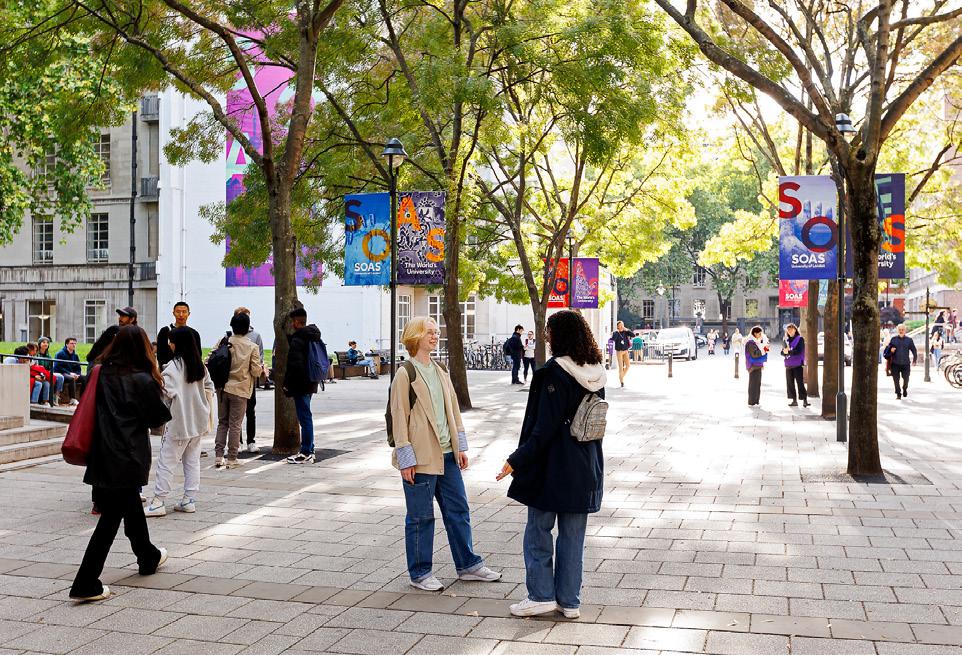
We offer degree programmes across the Arts, Humanities and Social Sciences, including subjects such as Development Studies, Law and Management. Our extensive expertise in Africa, Asia and the Middle East shapes our understanding in order to tackle the global challenges of our time.
Undergraduate and postgraduate scholarships
Student accommodation to suit individual budgets and preferences


Loughborough University is proud to be one of the UK’s leading universities. Home to a diverse community of over 19,700 students from over 130 countries and regions, you’ll be joining a university that is well known for offering a life-changing experience, both academically and socially.
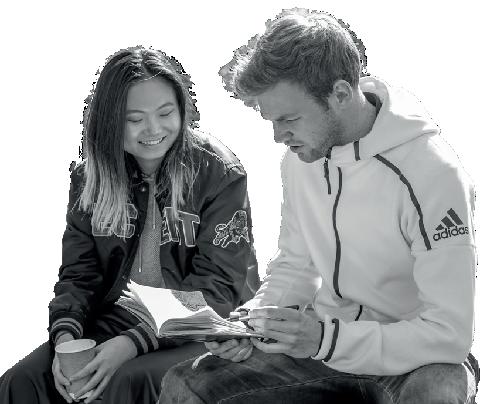
Our campus is home to excellent learning and sporting facilities and full of green open spaces. Our community spirit sets us apart and we offer a safe place for everyone to enjoy.
Undergraduate degree courses span a huge range of subject areas, including business and economics, engineering, design, creative arts and more. All undergraduate degree courses come with a placement year option, so you can maximise your employability skills and take advantage of a first-class education.
Our Loughborough campus also offers postgraduate taught and postgraduate research degrees, while our London campus is dedicated to postgraduate study and is based at the Queen Elizabeth Olympic Park.
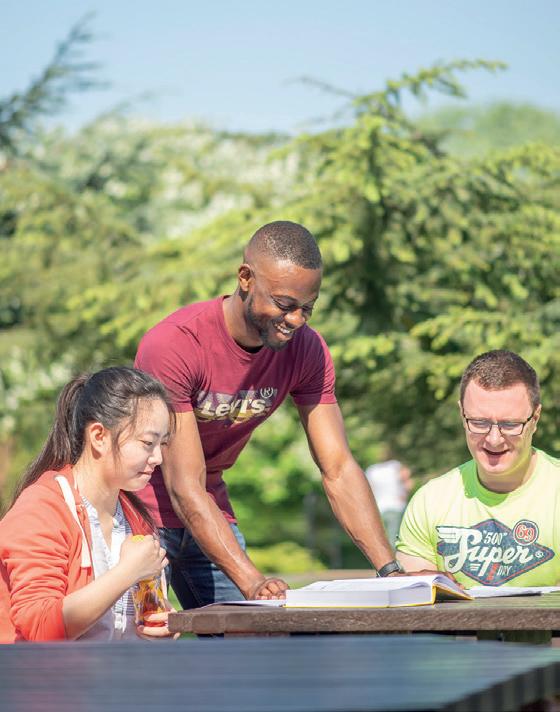
We believe we can help you to build the future you want. With our support and your determination, anything is possible.
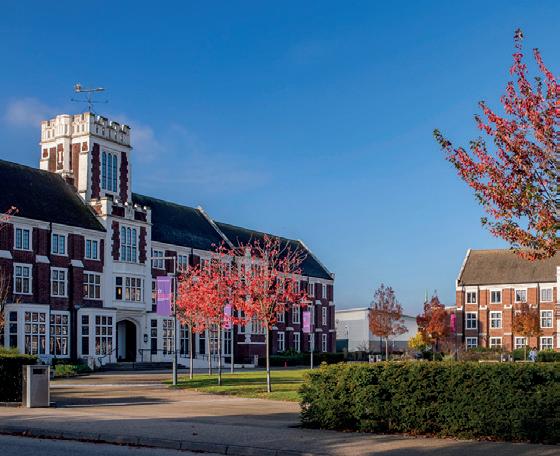
WHY DO SA KIDS CHOOSE TO STUDY ABROAD?
HOW DID THEY FIND THE EXPERIENCE AND WHAT ARE THEIR TIPS?
ALEXANDER REKHVIASHVILI
BSc Accounting & Finance, Leeds University Business School
High School: St John’s College, Johannesburg
I honestly had no university in mind and just based my decision-making process initially on the rankings. Then, with some research, I saw myself living and studying in the UK.
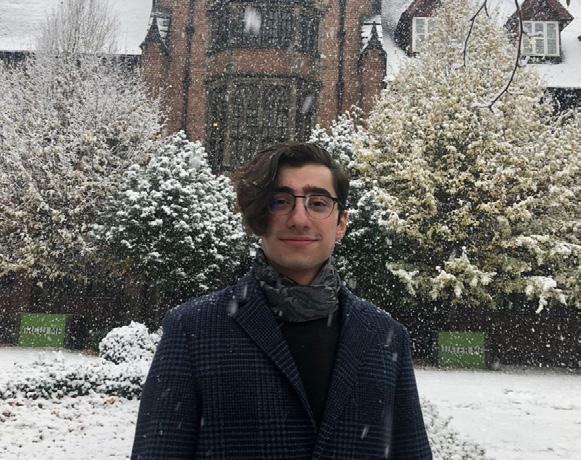
I think the best part of accounting is seeing the real world applications and the biggest surprises seeing how multi-faceted the degree is. It isn’t just the maths – it’s law and investigation and thinking about all the different ways a business can achieve certain goals.
I found groups of friends through class seminars and lectures and otherwise just through accommodation, especially in first year. I don’t find myself home sick very often – I’ve been lucky enough to go back home frequently and otherwise my family and I have made it a ritual just to call each other frequently. But you do begin to miss the small rituals you get around the house, like family gatherings for movies every weekend.
I certainly feel especially that I’m being prepared for a career in accounting and I’ve been lucky enough to secure an internship with a “Big 4” audit company, which I feel will definitely play a big part in my future.
BSc Marketing and Management, 2nd year, Durham University, High School: Herschel Girls School

Studying in the UK appealed to me due to the outstanding educational opportunities the universities offer. The facilities, the quality of education and the efficiency is unparalleled. The UK also appealed to me as it is an English-speaking country. This encouraged my decision to study here as having no language barrier would help me make friends easier and overall transition smoother into my new life.
I absolutely love Durham’s collegiate system. Being an international student, this system definitely helped me find my feet more quickly as your college’s identity and traditions connect people very quickly and foster a shared sense of belonging. Sport, events, clubs/societies and daily life in general is all college-based. This has helped me get to know the people around me faster and as a result this is where I’ve made some of my closest friends. I also love the fact that Durham is a “uni town” –wherever you go you will always bump into someone you know. Even though it is not a big place, it has a vibrant campus culture.
Something that surprised me was the array of sports, clubs and societies on offer. I had to rein myself in a bit and only choose my top two or three as these clubs keep you very busy with many organised events and socials and each club does require a membership fee. But it’s important to join clubs, societies and sports even if you’ve never played them. Not only are they loads of fun, but the more involved you get the more people you will meet.
I’m very passionate about hockey – I play for Durham and have made some amazing friends through the hockey club – I would definitely say it has formed quite a big part of my ‘uni experience’ so far. For fun, I also joined other sports club’s I have never tried before such as football, lacrosse and skiing/snowboarding. This was a great way to meet a variety of people and each clubs lively social scene adds a different flavour to your uni life.
It is also a good idea to invest in a railcard. If you are wanting to travel around the UK or are going to use the train often, you will save yourself money in the long run! Also make use of student discounts on public transport –it’s super affordable and will save you so much time. If possible, I would also recommend on-campus accommodation. I thoroughly enjoyed my time living on-campus as living so close together meant there was always someone around to hang out with or something fun to do just a few minutes up the hall from you. A tip for 2nd year is to get onto the housing situation quickly. Visit an estate agent early to look at housing options as it is a very competitive market.
Studying aboard does not come without its challenges and I have had to deal with homesickness this last year. I’ve missed my family, some of my favourite foods and the sunshine weather from home. However, I involved myself in all aspects of university, which was exciting, kept me busy and helped distract me from feeling homesick. There was also always the video and phone calls to friends and family that helped comfort me. Later on, I made some good friends who could relate to what I was feeling which also helped.
Although I have only just finished my 1st year, I feel that I am in the process of being prepared for a future job/career. My modules are relevant and practical, equipping me with the knowledge and skills needed in the workplace.
I do not have a job for after graduation yet, however Durham offers great networking opportunities and the collegiate system specifically cultivates a strong alumni connection. These connections could prove beneficial when looking for internships or work placements.
From an engineering perspective, Loughborough is very well known for their engineering and there is good support for engineers at the university with engineering companies on campus that are linked to the department. Loughborough University is also consistently ranked in the UK top 10. The university also offers opportunities to balance your studies with sport, and of course your social life, which is important for your mental wellbeing and helps you find friends and connections.
BSc Bioengineering, 2nd year, Loughborough University
High school: St John’s College, Johannesburg
I decided to study in the UK because my degree, Biomedical Engineering, is not offered as a professional degree in South Africa. Secondly, the UK offers much more opportunities for my field and there is a good support system to help students find work in the UK. The research and innovation facilities, as well as the funding for this, is better than South Africa.
I love having a campus-based university life at Loughborough. It made settling into the university much easier as I am able to easily access the facilities on campus. Having catered accommodation has made it easier to make more friends, as you meet people at the lunch hall. It also saves a lot of time when you are playing sports and studying.
I handled home-sickness by always keeping in touch with my family and friends, as well as having objects from home in my room. I definitely miss the South African weather (especially in winter) and having the luxury of space at home.
I play hockey for the university and hall cricket. I was involved in creating the Southern African Society at Loughborough and am also involved in the Indian and Engineering societies.
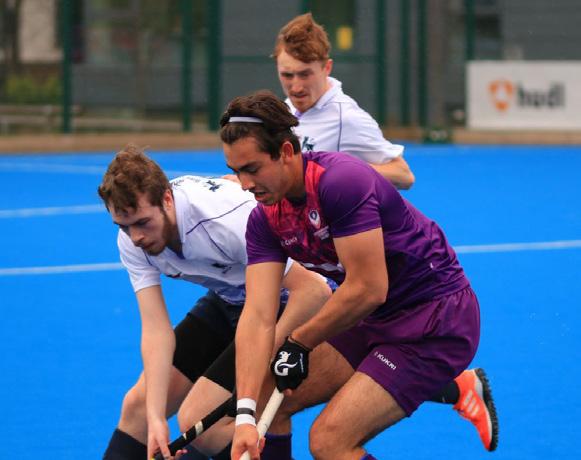
The university offers a lot of career support, workshops and events. The careers network at Loughborough sends regular emails regarding internship and work opportunities, and connect you with useful platforms that promote job opportunities. I have just completed my first year, so I am on the path to finding work after graduation.
BEng Electronics and Computer Science, 3rd year, University of Edinburgh
High School: Westerford High School, Cape Town
I decided to study abroad as UCT’s transition from in person to online learning during COVID was terrible for the engineering department and Edinburgh’s engineering department is highly respected.
I love the fact that it is a student city, like Stellenbosch but with even more people, and access to the whole of Europe. 10% of the population are students and Edinburgh itself is one of the most beautiful places I’ve visited.
A good tip is to get accommodation sorted early and cast a wide net, as in-demand cities have terrible housing crises at the moment. For banking, I recommend a simple Monzo or Revolut Supreme. And get a railcard asap – the deals are super useful and I sometimes see tickets to London for only 40 pounds return.

For homesickness, I usually went to Nandos and there is even a Kauai in Edinburgh. I also connected with my South African friends and went to South African events –never watched that much rugby before and now I watch almost every SA game!
Loughborough University was recently crowned British Universities & Colleges Sport champions? “Throughout another campaign of sporting brilliance, Loughborough teams were victorious in women’s basketball, men’s badminton, women’s football and men’s tennis, among others. Teams from the University were also crowned champions in women’s cricket, men’s hockey, and more.”
I have a tennis group that I play with and a football team that I’m a part of, but it’s separate from the uni. I go to most of the South African Society events to shush away any homesickness. Societies are an excellent way to make friends – even just going to their events often will help.
I highly recommend Edinburgh as the place to study because the balance between studying and living is done extremely well. The culture is not work work work or fail – it’s fun and ambitious. It’s extremely international – my flatmates from last year were from New York and Hamburg and our flat was a literal multi continental breakfast!
Edinburgh is perfect for me and I’m pretty sure it would be for a lot of people.
BA International Relations, 2nd year, Exeter University
High School: St John’s College, Johannesburg
It has always been a goal of mine to study and live in the UK. Being offered a place at Exeter presented me with an opportunity I couldn’t refuse.
The weather in Exeter compared to the rest of the country is good. My biggest surprise was the amount I have in common with other students here, and the number of South Africans that have created a community in Exeter.

As a sportsman, I am very glad to be at a uni that promotes sport like Exeter does. Taking part in extra activities within the uni is essential to making friends and meeting people. In my case it has been playing sport, but there are many other activities too.

Staying in contact with my friends and family helped me to never really feel too homesick. Keeping active and not being alone also helps a lot in keeping you happy. What I missed most about home would probably be the easy access to the things I love such as golf.
The uni has helped me with employability, with courses on the topic being offered. Through speaking to a number of my friends about future job prospects, I have gained a better understanding of what I need to do to get a job after graduation.
MSc Physiology and Nutrition of Sport and Exercise, Loughborough University
Undergrad: BSc (Hons) Exercise Science, University of Cape Town High School: Westerford High School, Cape Town
I wanted to be able to get a job in the UK as I think the opportunities in the UK are better than in South Africa. I really liked the idea of feeling safe and freer, as I felt quite stressed with regards to safety quite often in South Africa. Loughborough University is also the best university in the world for sports related subjects so I wanted to complete my Master’s there.
I love how often there is sport going on at Loughborough and I loved living on campus, as I felt a part of a community and met a lot of friends through my accommodation/flat mates. I did not realise that there were some words that British people didn’t understand. I thought more people would know about braais and I did not realise that pants in the UK are underwear – so make sure when you are talking about pants to say trousers instead!
The University of Exeter offers the #1 Rugby programme in the UK, came in joint first for Business Graduate Prospects, and is UK Business School of the Year (Times Higher Education Awards 2022).I would recommend staying on campus as it makes making friends easier and you can feel a sense of community. Opening a bank account is a bit tricky as an international student and can take some time, so I would recommend doing that ASAP. Most of the letters that you require for opening a bank account will be on the university website. With regards to making friends, be open to being friends with new people and just be friendly, but do not put too much pressure on yourself to make friends, you will meet new friends in due course. Also – if you are going to the UK – buy yourself a 16–25yr railcard. It is 30 pounds for one year, but you save a lot of money in the long term.
I did miss home a few times, but I had less home-sickness than I thought I would. I would phone home, eat some South African food, and just chat to friends. I missed the familiarity of home and just the ease of it. It is difficult moving to a different country with a new culture and it can be tiring sometimes when everything is new. I missed chatting to old friends because your new friends will not know some things you experienced in the past or some inside jokes from home, so make sure to chat to your friends from home! In Loughborough there is a Southern African Whatsapp group with a lot of South Africans on it – it was really nice to interact with them and have a few braais and watch rugby. So try join that!
I was not part of sports or societies too much, but now looking back, I regret that! So definitely join in as much as possible early, if you feel like you can! I did play tennis on My Lifestyle, and went to Zumba every Monday (was SO much fun!). I also recommend taking gloves (preferably with the pads on the fingers so you can use your phone), waterproof shoes or walking shoes, because you walk a lot more in the UK than in SA, and a beanie!
The careers network is really helpful and I have had multiple visits with them. I do not have a job lined up for after graduation, but I am currently applying!
CHRISTIAN STEHLIK
MPhil Real Estate Finance, University of Cambridge
Undergrad: BSc (Hons) Property Studies, University of Cape Town
High School: Bishops Diocesan College, Cape Town
I’ve always wanted to study abroad in an unfamiliar place. In addition, the privilege to study at one of the best universities in the world, attended by some of the most influential people in history, was an opportunity I couldn’t pass up.
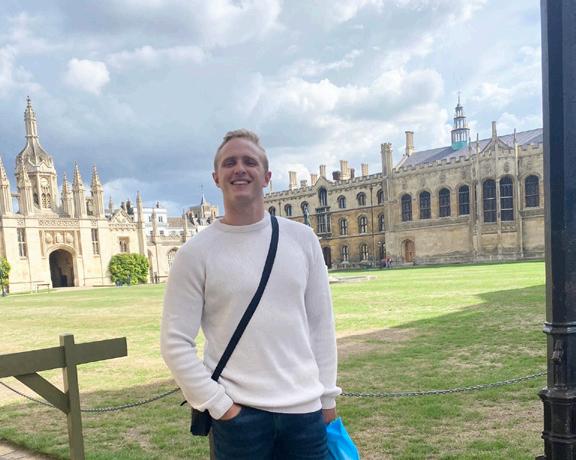
I did my undergraduate/honours at UCT, so I hadn’t experienced living and studying in a student town – being able to walk/cycle with mates to class has been great. I love the small student-town experience, and Cambridge University is so multicultural – I had over 96 different nationalities in my college.
The weather was the biggest surprise – playing rugby in 2 degrees on frozen pitches wasn’t great! Make sure you have a good waterproof jacket for the cold and wet winter months.
Confetti, part of Nottingham Trent University, are specialists in creative technologies and have over 25 years of expertise in games, media and music. Have a look at BSc Esports Production and Confetti X, our commercial, purpose-built esports and virtual production venue.
Try your best to live in a res/student accommodation. It makes meeting people and making friends so much easier. I would also recommend (for the first couple weeks) trying to eat in the residence cafeteria relatively often – you meet so many people this way. I prefer cooking my own food, but trust me on this one! Also get involved in as many of the sports clubs/ societies offered as possible! I was heavily involved in the Cambridge University Rugby Club. Team sport was the easiest way for me to make friends and really made my experience that much richer. In addition to sport, I was part of the Real Estate Finance and Investment Society.
I’m not someone that gets homesick much but there were times where all I wanted to be was home! Having friends that are able to sympathise really helps! I tried staying as busy as possible during these times. I also
found that having my flight home booked (whether for Easter or Christmas etc) reduced the homesickness. [Banking can be an issue.] I used Revolut online bank which was great – really easy to use and minimal fees. I’ve also got friends that use Monzo, which seemed to work perfectly too.
I can’t stress how quickly a one-year Master’s goes. Really take everything in, try to say yes to everything and really make the most of the opportunity – it will be the best year of your life!
Having studied a Master’s, I feel that my skill set/ experience really stands out from others. In addition, I was lucky enough to have completed various short internships while at UCT – something I would really recommend doing (the competition in the UK job market is intense). The university circulated our CVs to potential employers which was very helpful.
MSc Data Science, Loughborough University
Undergrad: BEng Mechatronics, Stellenbosch University
High School: St Andrews College, Makhanda
I have really enjoyed the friendships I have made while studying abroad. I had done a lot of research into Loughborough and spoken to numerous alumni about the university so there have not been any major surprises to me, other than a completely unique uni experience compared to Stellenbosch.

A very large factor of coming to university abroad is being able to feel safe and welcome. I feel that Loughborough provides that. The social life at Loughborough is also great with excellent transport on and off campus enabling students to roam freely around Loughborough.
The halls accommodation, being situated on campus, has not only helped with finding like-minded postgraduate friends but has enabled me to have easier access to the world-class facilities that Loughborough has to offer. I have also really enjoyed the sporting professionalism of being a part of the Cricket Athletic Union, which was another reason for me deciding to study at Loughborough. After hearing about Loughborough sport as well as the facilities, such as the ECB cricket centre, I was extremely excited to be part of it all. My overall uni sporting experience has met my expectations and has been a crucial part to my enjoyment at Loughborough.
I feel that my degree has prepared me to be able to solve problems with the Data Science perspective as well as enabled me to be able to pursue my passion for Artificial Intelligence and Machine Learning. This has stood me in good stead for opportunities that will arise after my studies. I am currently in the application process for jobs after graduation and feel confident that I will be able to find a job in a field I am passionate about.
Within 15 months, 91% of graduates from the University of the West of England (UWE) are in work or further study. More than 150 of the university’s pioneering courses have been created in partnership with industry and come with professional accreditation. Bristol is one of the greenest cities in the world, named one of the best places to live in the UK (The Times, 2022).
Raphaely and other parents look back and report on what they wish they had known before sending their children to study in the UK.
Education in the UK is one of the greatest gifts you can give your ambitious child, but could be one of the greatest shocks you gift yourself.
My son, (or DS* as parents who send their kids to uni in the UK call their boys!) is entering his third year studying a BEng in CompSci and Electronics at Edinburgh University. Hooray! Almost Done? Er no. Undergraduate degrees in Scotland are four years, not three. I wish I’d known that when he told me he’d been accepted. Our wallet, wishes that I’d registered that fact… more! If only I’d done my research.
Never fear, parents dreaming of dreaming spires and ivy-clad Russel Group unis. We’re here to offer you the 20:20 vision of hindsight!
I wish I’d known about What I Wish I’d Known about University (WIWIKAU). For every possible question you have that will need an answer, this 42 000-strong Facebook group is your very best starting point. Think of SA’s The Village, but for international parents of kids heading off to uni in the UK. Here you will get an informed, thoughtful, supportive, helpful answer. Join!
“You will need expert help to navigate the process,” says Villager Tanya Brice, and I agree. Chat to an experienced, reputable university consultant. Of course, I’m going to recommend our own editor, Heidi Sulcas, and her company The Learner’s Journey . She comes highly recommended, and not only by me! A student had this to say about her: “Heidi was such an important piece in my application process … When you have someone that’s as knowledgeable as she is about such a complex process it makes it super easy! Something that sets her apart is that she understands different education curriculums ... She’s always had my best interests at heart.”
WIWIKAU are partnered with another brilliant international university guidance counsellor, Louise Thomson Fernet, and her company is Expat Student
3.
There are many great expos in SA - both online or in person. Global education are leaders in this field and their expos feature representatives of many UK universities.
4.
You will need to do your sums, and save. Lisa Tarr, a South African member of WIWIKAU warns: “Our son just finished first year at Exeter. As we are not British, fees for international students are extremely high. £25 000 or more per year. And NO student loans. These fees can be split into three payments [this might be dependent on the uni]. Then you have to add accommodation, flights home and living expenses on top of that.”
Engineering at Edinburgh starts at £28k per year. Accommodation in halls, for first year, is on top of that. Accommodation in digs in Second to Fourth Year, more again. Choosing to go to university in London, means London accommodation prices…
Remember our currency is not your friend. If you are stretching to pay for your child’s First Year, imagine the worst for Year 3. Budget wisely and realistically.
5.
“Going into second year, and beyond, your student will need a guarantor for digs,” Lisa adds. “As we are not British, we could not be guarantors, therefore rent has to be paid upfront for the year. Some landlords may let you pay half upfront, and half midway through the year, while British tenants can pay monthly.” Finding digs in uni cities and towns is a nail-biting and competitive process, AND its easier for groups of girls than boys … (My son couch surfed for a month in his second year before finding a flat of his own.) Better get your ducks in a row.
6.
“Another hidden cost is medical expenses, to be paid upfront for the length of the course – in our case, three years,” Lisa continues. “This payment has to be made in order to get the visa, if you are on a SA passport, regardless of what medical aid you are on. This gives your child access to the NHS.”
7.
Claire Richardson on The Village advises: “There are many good universities that you haven’t heard of. Get a copy of The Sunday Times Good University Guide and familiarise yourselves with what they all offer.”
8.
“Make sure your student buys a 16–25 railcard for journeys to explore the country. Look out for student discount cards. Both offer considerable savings!” says Colette Saunders on The Village.

9.
As Louise Thomson Fernet from Expat Student reminds us, don’t forget about Clearing. “If your student doesn’t get the offers that they want or doesn’t do as well in their exams as they hoped, Clearing is a great way to find courses that still have spaces. There are often lots of competitive courses from prestigious universities in Clearing.” (Clearing is how unis and colleges fill any places still available on their courses. From 5 July – 17 October 2023, you can apply for a course using Clearing if you’re not already holding an offer from a university or college, and the course still has places.)
10.
“Obtaining the student visa is often nerve-wracking for families,” says Louise Thomson. “The UK government website explains everything very well, and your future university will guide you through the process. It can take a few weeks, so don’t wait too long after results’ day to start the process.”
We assist you with the entire university application process to all of our university partners.
We assist with overseas student visas by providing all the information required to ensure a successful application.

Our offices are IELTS booking centres and we are a registered UCAS centre for all UK applications.
We guide and assist students with securing their on-campus accommodation.

to study at leading universities in the USA, Canada, UK, Ireland, Europe, Netherlands, Cyprus, Australia and New Zealand. As authorized representatives to the universities abroad, we handle your entire application process directly and submit your application to the universities on your behalf, guiding you through every step, ensuring your application process to study abroad is as stress-free as possible.

 Owner and founder of Global Education Liza Manoussis
Owner and founder of Global Education Liza Manoussis
Heidi Sulcas reveals how an NSC matric (IEB or DBE), IB or Cambridge certificate impact a student’s prospects PLUS everything you need to know about UCAS.

Does your child qualify with a South African matric? What do UK universities see when they see our Umalusi National Senior Certificate (NSC)? Are South African kids ready for university in the UK – how do they fare compared to other curricula matriculants? And who can help my child with their applications?
These questions are inevitably the beginning of most conversations I have with students and their parents. Then there is the question, “Do I move my child to a school with a different curriculum to give them a better chance?” (Please go to University Speaking Issue 2 where I addressed common myths around the Cambridge curriculum.)
Every learner’s journey is different – no two are the same. There are reasons to follow something other than the South African matric (NSC) but be sure that the reason is based on fact and not hearsay, and that you get the information from someone in the know. I have been on a mission to research this question for the past 5 years.
Bottom line: there are a few UK institutions and faculties where the NSC is not recognized as adequate for direct entry into an undergraduate degree regardless of grades.
In almost all circumstances, following the NSC with a year at a local university or with a foundation/pathway programme removes that obstacle.
Recently, I sat down with the international recruitment manager at Exeter, a top UK university and a member of the Russell Group. He shared with me that they track their students and monitor their performance after the first year of university to see how they are coping. Given that he spends a lot of time in South Africa, he takes particular interest in how our NSC students perform (that’s students who attended IEB and government schools). He reports that they are coping very well and at the end of first year are in a similar position with kids who have followed Cambridge, IB, the German Abitur and the French Baccalaureate. Of course, he has no idea whether a child with an NSC attended an IEB or government/DBE (Department of Basic Education) school.
There is an important clarification to make about our South African National Senior Certificate (NSC). It is governed by the Curriculum Assessment and Policy Statement (CAPS). Many parents of IEB learners do not realise that the matric certificate their learners receive after writing the IEB (Independent Examinations Board) exams is identical to the one that learners at schools administering the Department of Basic Education (DBE) exams receive. There is no distinction between the two nor is the government allowed to make that distinction by law.
From studies done by the South African government, we know that the performance of DBE and IEB students on the National Benchmark Test for admission to some of our public universities is virtually equivalent.
If IEB has a greater representation in the UK, I suspect it is influenced by the financial position of families attending private IEB schools, rather than the IEB system itself.
Before I infuriate my friends who are IEB educators, I recommend making decisions about your learner’s curriculum based on the ethos of the school and how THEY teach. Some kids are more suited to a smaller school with smaller classes, many of which are IEB schools, while others like bigger schools where they get to be more independent/out of the spotlight while “doing their own thing”. Both may say that they focus on teaching learners critical thinking skills – but that comes down to each individual teacher.
This is a parenting decision – decide which environment resonates with your child. There are brilliant DBE schools and IEB schools and private tutor centres. And there is a school that is a fit for each child. I am firmly in the camp that a good student is a good student is a good student, regardless of the examination board that administers the final exams. Such a student will stretch themselves and go beyond what is expected of them in their own time and own learning.
Often, it is one teacher or educator at a school that makes the important difference to a child, inspires them and becomes their mentor, not out of obligation but because that teacher has resonated with them in some way.
At the end of the day, all my experience in placing students in overseas universities confirms that an academically curious and passionate student is what these universities are looking for. They are not looking at the curriculum first.

Is the journey to UK university acceptance easier for students following the IB or Cambridge curriculum right through school? Sometimes but not necessarily. Choosing subjects for the IB programme and A levels requires forward thinking and “beginning with the end in mind” counselling.
It does happen that a learner’s interest changes and then their subject choice affects their potential acceptance or application to chosen degree paths. To be fair this can happen with an SA matric as well. Luckily, at most UK universities, for many degree paths, this can be fixed through a foundation year.
I often get the question: “Doesn’t the IB or Cambridge or IEB curriculum give my child a better chance to get offers at UK universities?”
Nine times out of 10 the answer is no. Your child gives themselves a better chance to get offers by doing the work to finish strong with the best results that they can get. A child who finishes with three Bs on A levels is generally not seen as a better candidate than an NSC student with five distinctions. And in many circumstances the A level child has had to give up other aspects of school life to get those results, if they have not progressed from an IGCSE background.
Cambridge is a curriculum that is meant to be followed from IGCSE through to A level. Picking up this curriculum after Grade 10 of the NSC FET (Further Education and Training) phase can be challenging for a learner. The same goes for the IB (International Baccalaureate) curriculum.
Am I discouraging the shift in curriculum? Not entirely but I am saying that the decision requires careful examination and discussion with a counsellor who knows the ins and outs of the curricula, of UK university requirements, and can professionally assess the learner and their commitment.
I don’t say this lightly. I am the parent of a child who went from the CAPS curriculum to self-schooling on Cambridge. I will be the first to acknowledge that, as a parent, I made every mistake in the book and it is partly this experience that compelled me to start The Learner’s Journey and University Speaking.
The UK universities use a national consolidator known as the Universities and Colleges Admissions System or UCAS.
UCAS is user friendly and navigating your way through it is not “rocket science”. However, I always recommend working with someone who knows UCAS and knows the nuances of the finer details.
Unravelling admissions requirements and understanding the nuances of how our NSC compares for admissions takes a counsellor with experience. For instance, how does an AAA in Cambridge compare to the NSC results where we get 1 to 7 for 6 subjects (LO is excluded for UK applications)?
The biggest issue is choosing the university programmes for which the learner is qualified because 14 days after a UCAS application has been submitted, no changes can be made. A second UCAS application cannot be submitted, and the student will have to wait for Clearing, which opens in July for courses that have not been filled in the regular UCAS process. If your course is a high demand course, it may not be available in Clearing.
Clearing is open from 5 July to 17 October 2023 for the 2023-24 school year and from 5 July 2024 for the 202425 school year.
Note that at least one teacher recommendation is required for the UCAS application. Be sure to get that ahead of time – ideally, before your child leaves high school.
Once I have worked with a student and we have determined the five university programmes that they will be applying for, I refer my students to Maxine Kruger of Global Education for application. She walks students through the UCAS application and also helps with their Study Visa at no charge. There are a few universities that also have direct application access and Maxine represents many of them as well.
When your child does their applications, their counsellor will recommend universities that they are likely to be qualified for – perhaps splitting between universities that are a sure thing and ones that are a bit of a stretch. For UK applications, you report all of your subjects on your NSC, but your top five marks will be considered for admission. You get to drop your lowest subject. In addition, some degrees have subject requirements, like Maths for engineering or finance. If that subject is not one of your top five, it’s not a train smash, but there is likely a minimum requirement in that subject.
Some students will receive a conditional offer to a university. This means that their acceptance is conditional upon the execution of a few items. In most cases, it is the provision of the NSC certificate, proof of English proficiency or actually accomplishing the marks on final exams (or close to it) that the student selfreported on their UCAS. Self-reported marks are usually the results from preliminary/mock exams.
If a student decides to accept the conditional offer, the student is allowed to make a firm choice and an insurance choice. This means that if the student doesn’t meet the conditions of his firm offer, his place will revert to his insurance offer. Your firm offer should have higher conditions than the insurance offer, generally speaking.
Once you have accepted an offer, it is legally binding according to UCAS. So before accepting, make sure you chat through your options with your counsellor.
If a student receives an unconditional offer, they are IN and have the option to accept or reject their offer. Once an offer is accepted, all others fall away.
Your deadline to reply to your offers will be set once you’ve heard back from all of your chosen universities or colleges.
If you receive your last decision on or before 16 May 2024, your reply date to accept or reject offers is 6 June 2024. If you apply by the equal consideration date, you should hear from your choices by 16 May.
If you receive your last decision on or before 17 July 2024, your reply date is 24 July 2024.
Use your UCAS Hub to track your application status and offers.

16 MAY 2023: Applications for 2024 entry courses opened, but can only be submitted to UCAS from 5 September 2023.
12 JULY 2023: Conservatoires applications open for 2024 entry.
2 OCTOBER 2023: Closing date for conservatoires music applications.
16 OCTOBER 2023 at 18:00 (UK time) – deadline for any 2024 course at the universities of Oxford and Cambridge, and for most courses in medicine, veterinary medicine/science, and dentistry. You can add choices with a different deadline later, but don’t forget you can only have five choices in total.
31 JANUARY 2024 at 18:00 (UK time) – deadline for the majority of undergraduate courses. This is the “equal consideration date”, which means that any application received by this deadline will be reviewed. An application may be submitted after this deadline but there is no guarantee of it being seen. Applicants for high-demand courses like computer science should aim to have their applications in by this date.
31 JANUARY 2024: Closing date for most conservatoires dance/drama/musical theatre applications.
28 FEBRUARY 2024: Extra opens. If your child has used all five choices and is not holding an offer, they can add another choice using Extra.
30 JUNE 2024: Last date for receipt of applications with choices. Applications received after this deadline are automatically entered into Clearing.
4 JULY 2024: Extra closes
5 JULY 2024: Clearing opens
Established in 1900, the University of Birmingham has been challenging and developing great minds for more than a century. Birmingham is a world leading educational institution with a vibrant campus and located in the second largest city in the UK.
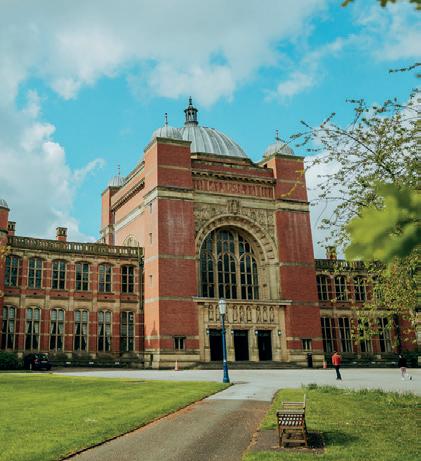
We encourage bold, independent thinking and offer a high-quality academic experience to stretch and challenge you. Our popular subjects include:
■ Business and Finance
■ Engineering
Birmingham

In 2018 the University of Birmingham became the first global Top 100 and Russell Group University to establish a campus in Dubai. Our campus offers the opportunity to gain a world-class British university education in one of the world’s most dynamic and exciting cities.
For more information about our Dubai campus: www.birmingham.ac.uk/dubai
■ Law
■ Computer Science
Check out the full list of our programmes: www.birmingham.ac.uk/study
■ Social Sciences
■ Medicine
No matter what your current fitness or ability level is, the University of Birmingham offers 58 sports clubs available for students.
For student-athletes competing at a junior international standard (or above) within an Olympic and/or Commonwealth sport, we have a range of Sports Scholarships available.
University of Birmingham Elite Dual Career Athlete Pathway (EDCAP) Scholarships
■ Provides sector-leading dual career support that aims to mirror that of a world-class performance programme

■ Access to a dedicated Performance Centre, state-of-the-art facilities and expert practitioners
Find out more about our sports clubs: www.sportandfitness.bham.ac.uk/sport/discover-sport | Email: h.v.waters@bham.ac.uk
Hannah is a 2022 FIH Hockey World Cup and Birmingham Commonwealth Games representative. Originally from Johannesburg, Hannah is a current EDCAP scholar studying MA Inclusion (Social, Emotional and Behavioural Difficulties) at UoB.

‘The EDCAP scholarship programme is really extensive and provides support across both my academic and elite sport needs and goals. Through the programme, I have access to world-class support in Strength and Conditioning, Sports Medicine, Nutrition, Psychology and Physiology.
The scholarship is tailored specifically to my individual needs as an elite, dual career athlete and a performance plan is put in place to help me reach the goals that I have set.
Being on the EDCAP scholarship has given me all the support I could possibly need to improve my own game and maximise my abilities to perform on the hockey field.’
Hannah Pearce Senior South Africa Hockey Representative■ Elite support services including Strength & Conditioning, Sports Science and unlimited Physiotherapy
■ Scholarships range from £3000–£12,000 plus additional funding available towards international representation abroad and personal development
Contact: www.instagram.com/unibirmingham/ www.facebook.com/unibirmingham www.twitter/com/unibirmingham e: africa@contacts.bham.ac.uk
What is the Russell Group? Are these universities “better”?

More competitive? Overseas study expert
Heidi Sulcas gives insight.
Over the years there have been many articles, persuasive arguments and opinions about these very questions.
The self-selected Russell Group was first formed in 1994, the year that the democratic Republic of South Africa came into existence, with a membership of 17 higher education institutions.
The impetus behind the formation was to ensure that the UK government was adequately representing their needs. The governing body of the Russell Group states that “its aim is to help ensure that our universities have the optimum conditions in which to flourish and continue to make social, economic and cultural impacts through their world-leading research and teaching.”
Is this not the goal of most global research institutions?
As with many organisations, which one might argue universities are, being a member of a consortium of a collective voice translates to bargaining power toward a common goal and amplifies the voices of its members. In this case the goals would be research collaborations, opportunities for students to have access across a variety of industries and institutions.
Remember that the Russell Group is now made up of 24 individual universities – 2 Scottish, 20 English, 1 Welsh and 1 Northern Irish. It is not a homogeneous groupeach has its own “personality”, heritage and origins.
Some of the programmes are three years long and some four years (Scottish). The other important bit of information to know is that there are universities who have been offered membership of the group and have declined.
What Russell Group universities have in common is that they are all world-class, research-intensive universities. But they are not the only ones. There are many statements about what the Russell Group represents as a whole – the goal of developing students and ideas to tackle global challenges, attracting research funding, maintaining the most outstanding classroom and learning experience, links with government, local and national, and links with business – and while all of this is true, it is not exclusive. But there is no doubt that the Russell Group (RG) unis have collective impact.
• Roughly one third of students studying at RG unis are international students.
• RG unis produce more than 60% of the research from the UK universities and, it is estimated, support more than 250 000 jobs across the UK.
• They inject more than £85 billion into the national economy every year.
Because of “brand recognition” the RG unis get a lot of applications and admission is very competitive. Several of the universities have acceptance rates that do not hit the double digits. So they take the best of the best.
If you don’t get into a RG uni, does it mean that you are not a good candidate for university in the UK? Absolutely not! Some faculties within universities are much more competitive than others and the acceptance rate can vary significantly.
The question really is – What is your expectation from your university career? Not every student is suited to a research-intensive university. There are many students who learn by doing and are suited to a more “hands on”/collaborative type of education. Because the RG unis take the best of the best, pressure to achieve and perform is felt by some students and that competitive environment can be crippling. Is every RG faculty this way? No they are not.
My recommendation is not to just jump at RG unis: they are individual institutions. Look for the best fit for your degree and your expectations for your university career, regardless of the name.
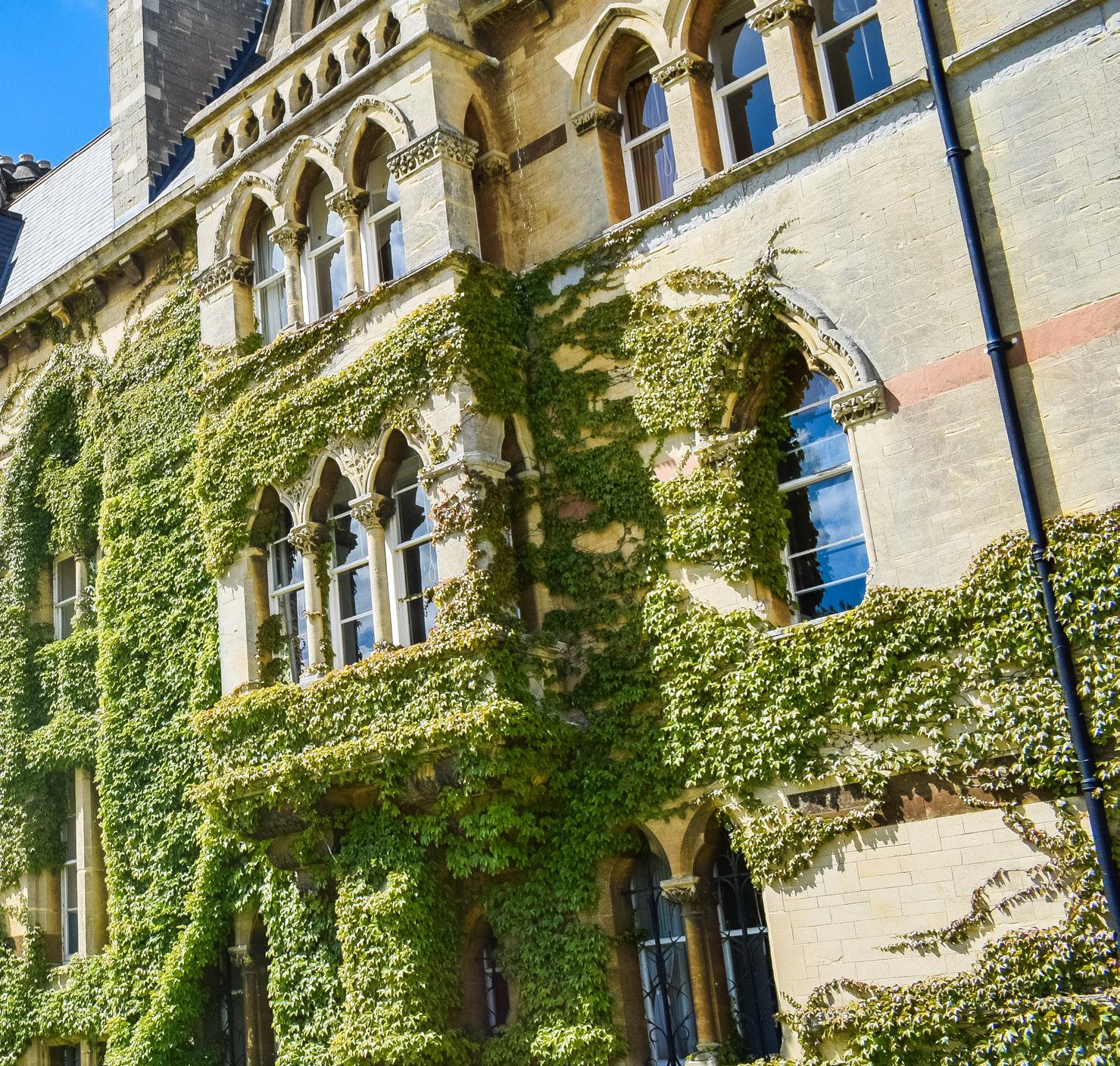
University of Birmingham
University of Bristol
University of Cambridge
Cardiff University
Durham University
University of Edinburgh
University of Exeter
University of Glasgow
Imperial College London
King’s College London
University of Leeds
University of Liverpool
London School of Economics and Political Science
University of Manchester
Newcastle University
University of Nottingham
University of Oxford
Queen Mary University of London
Queen’s University Belfast
University of Sheffield
University of Southampton
University College London
University of Warwick
University of York
Do you know about the UK’s “stay back” or Graduate Visa?
There are several attractive aspects to studying in the UK, one of which is international work experience. Many parents of university-aged children look forward to having them “off the payroll”, and the ability to work during and after a degree is key.
Working during the degree is certainly possible as work placements are readily available in the UK, making graduates highly marketable for post-study jobs.

And once your student has their UK degree, the UK allows them to stay back and gain even more experience. This is an incredible opportunity. Not many countries around the world offer a stay back visa, and where they do, it is certainly not as straightforward as the UK process.
A STUDENT WHO:
• Is in the UK
• Is currently on a Tier 4 study visa
• Has studied a bachelor’s, postgraduate or other eligible course for a minimum period of time with a Tier 4 study visa
• Has been reported to the Home Office by their university or college as having completed their course
THE GRADUATE STAY BACK VISA ALLOWS YOU TO:
• work in most jobs
• look for work
• be self-employed
• do voluntary work
• travel abroad and return to the UK
It excludes public benefits or work as a professional sportsperson.
Bachelor and Master’s graduates will have 2 years from the day that their visa application is approved. A student with doctoral qualifications will get 3 years.
A Graduate Visa cannot be extended and this time spent in the UK does not count towards Leave to Remain/ Citizenship requirements. However, afterwards it is possible to switch to a different visa, such as a Skilled Worker Visa.
The complete rules and regs around graduate visas can be found here
Don’t
Find
Sebastian Ferreira, from Cape Town, South Africa, has just completed his first year studying BSc (Hons) Food Science and Technology at Nottingham
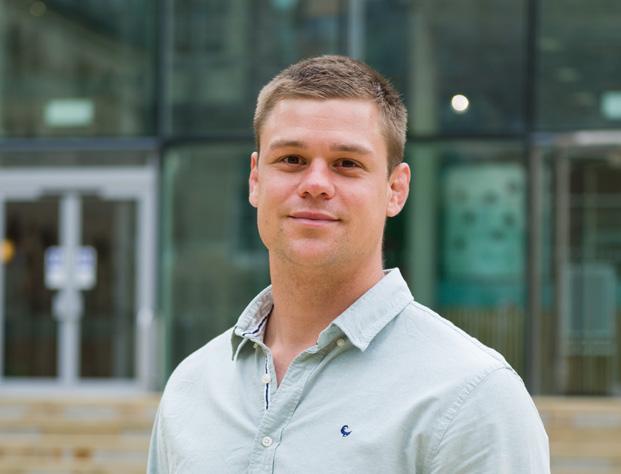
Trent University in the UK. We spoke to Sebastian about his course, his passion for Rugby, and his favourite things about Nottingham.
Sebastian chose NTU because it offered the perfect course in a great location. “Having done my research on food science degrees around the world this one stood out. With NTU being held in high regard as a university and being situated in a beautiful part of the UK, it was a no brainer to apply.”
And he was impressed when he arrived on campus. “I saw a well modernized campus, catering for almost everything a student needs. The help I received even before applying and being accepted was miles above what I had received from any other institutions I applied to.”
With a mix of course work and practical classes, Sebastian has loved the course so far. “The course gives us hands on experience from the industry itself as well as many events outside lectures with industry professionals themselves.”
The support provided by our course leaders is another thing I enjoy about NTU, whether it be conversations in passing or 1 to 1 sit down chats throughout the semesters.
Studying at NTU’s Brackenhurst campus, a working farm and wildlife haven that allows students to fully immerse in their studies, Sebastian enjoys some “pretty spectacular views, especially during the changing of seasons.”
Sebastian’s love for Rugby started early and he spent 11 seasons as a professional playing around the world before moving to Nottingham. “I initially moved over to purely study and focus on that part of my career, but I felt I could offer a lot more to the game, especially with my age and experience I could pass something on to the younger lads.”
Despite injury problems for most of the first season, Sebastian achieved great success. His favourite memory is his first game for NTU against the University of Northumbria. “The support I received throughout my injury was great. Constant check-ups with the physio and adjusted conditioning plans from the strength and conditioning department was what kept me motivated to get back playing.” Sebastian will hopefully return to action next year and continue his sporting career at NTU and Nottingham Rugby.
Nottingham has a lot to offer, with amazing experiences, life-changing opportunities, and a spirit all of its own. Whether you’re looking for a great night out or want to relax and unwind in a quiet café, there‘s plenty to suit everyone.
“During summer I love to get out for a round of golf or a long walk through any of the parks around Nottingham” Sebastian says. “Nottingham also offers some great sporting teams to go and watch live and events throughout the year.”
Nottingham Trent University has been named Modern University of the Year by the Times and Sunday Times and University of the Year at the WhatUni Student Choice Awards 2023.
We have a large international community and offer generous scholarships ranging from £2,000 to half-fee.

We offer a wide range of courses, outstanding teaching, and work experience opportunities. Subjects include:
• Architecture and Interior Design
• Biosciences
• Business, Management and Marketing
• Civil Engineering
• Criminology and Forensic Science
• Fashion
• International Relations
• Journalism
• Law
• Psychology
• Sports Science
Get
www.ntu.ac.uk/africa
The price tag of a UK undergraduate degree combined with a recent high school matric who doesn’t know EXACTLY what they want to do often has parents, understandably, reticent. For some, it may well be best to do the undergraduate degree in South Africa, and postgrad abroad.
Around 40% of international students in the UK are

When choosing a university for a specialist degree like a Master’s or PhD, you go for reputation: who are their alumni, who are their industry and innovation partners? A first degree is about growing yourself, finding direction, while the second is about diving deeper into your area of interest. That said, many Master’s programmes still allow some flexibility to explore additional topics via optional modules.

A postgraduate degree in the UK can be a transformative experience.
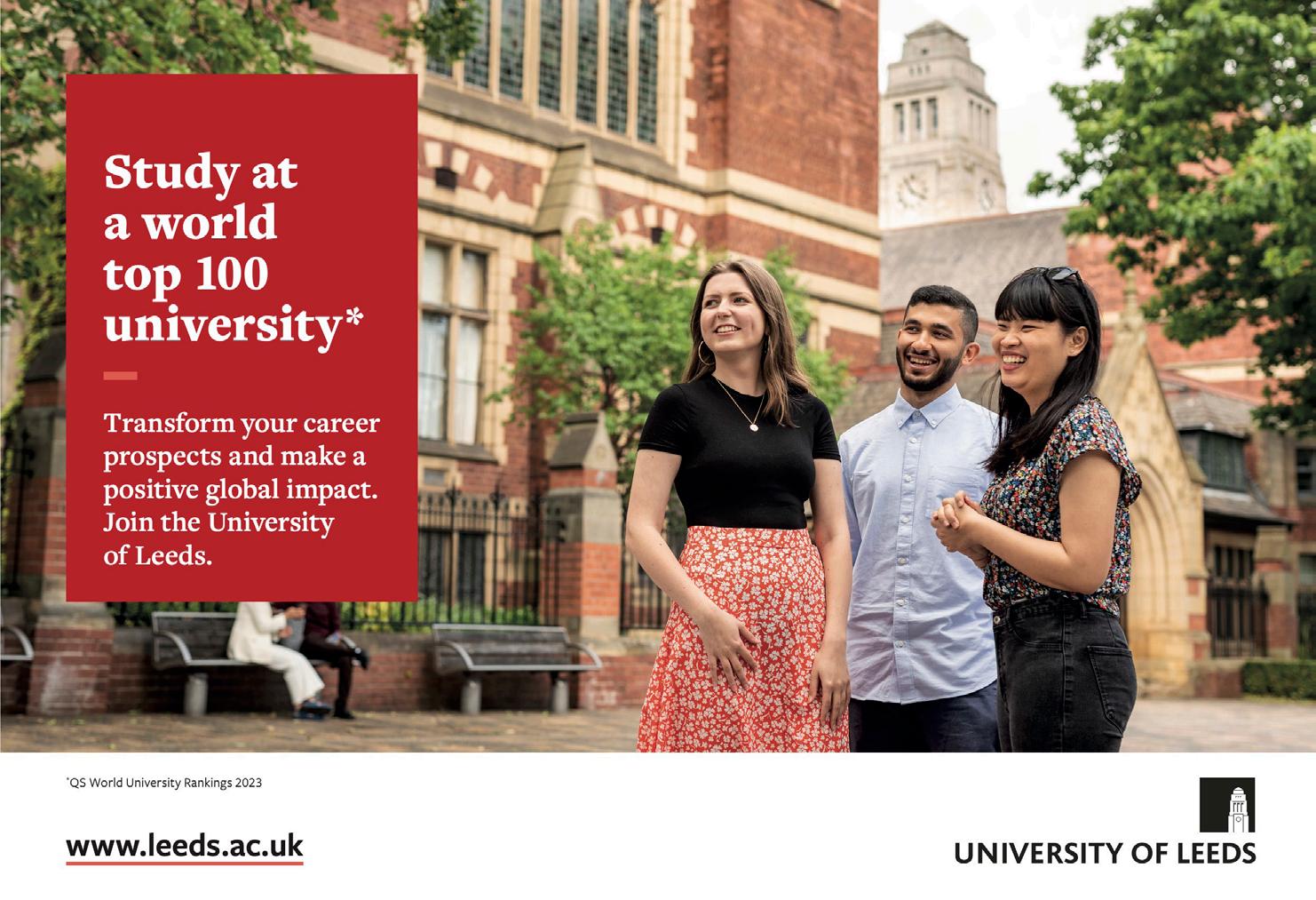
THERE ARE A FEW REASONS TO LOOK TOWARD THIS POSSIBILITY:
• Many Master’s degrees are 1 year
• You can get a 2-year graduate visa once you have completed your masters
• Tuition fees for a one year degree are lower than a three- or four-year undergraduate degree Another question that is often posed by South African undergraduate students is: “Will a higherranked university accept a postgraduate student who completed an undergraduate degree at a lesser ranked university?”
The key to success of many research universities, which are essentially think tanks, is diversity. Diversity of educational background, nationality, gender etc. So, generally the answer is “Yes”.
The deciding factor is always going to be whether you satisfy the admission criteria and have something to add to the “discussion and conversation” with the rest of your cohort. It is worthwhile to contact the graduate admissions office of the university that you have your eye on to ask what the criteria are for the programme that you plan to apply to.

If you have done your undergraduate degree in South Africa, a very important aspect of applying for a postgraduate programme in the UK is whether you satisfy the admission criteria.
While there are a few universities that will take you without an honours degree into a limited number of degree programmes, most Master’s programmes in the UK require an honours degree (or a top-up year), and not just a bachelor degree.
If you don’t have an honours degree, you’d need to do the honours year in South Africa, or a pre-master’s programme offered by foundation and pathway providers to prepare you for a Master’s programme.
The caution here is that not every university offers pre-master’s programmes and not every master’s programme has a pre-master’s pathway.
Be sure to consult a counsellor before making the decision regarding a UK pre-masters versus a South African honours programme.






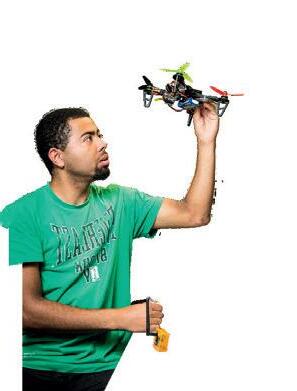






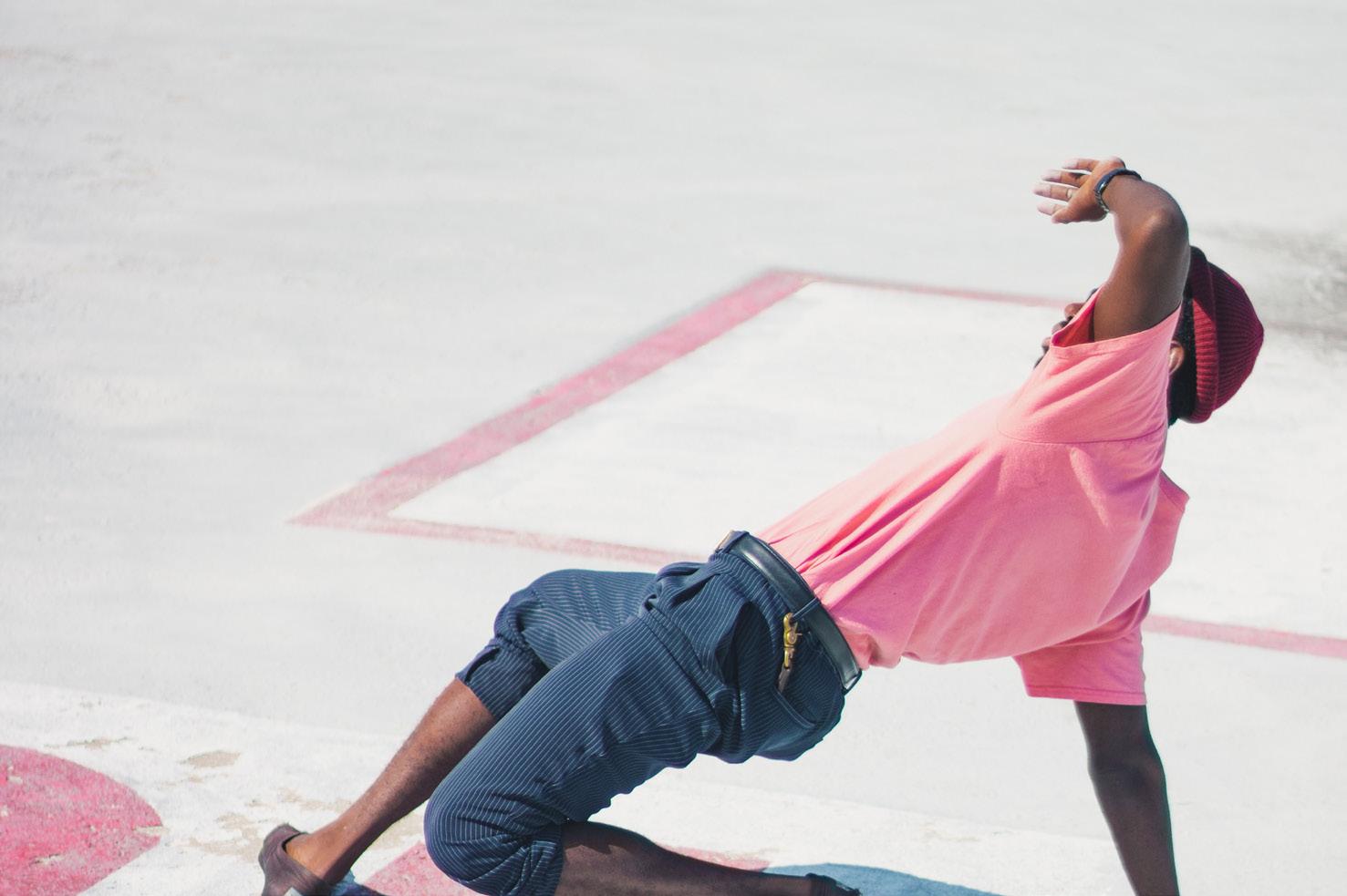
With more than 160 universities and more than 65 000 degree offerings at best estimate, there is so much on offer, especially if your child is leaning towards business, law,
First, take a look at some traditional degrees with an innovative spin: Portsmouth has developed a joint agreement with Edith Cowan University in Perth, Australia, to offer a suite of Dual Degrees programmes. These unique courses allow students to complete two Bachelor’s (Hons) Degrees in just four years, with time split between studying in the UK and Australia.
Now, let’s proceed to the out-of-the-box options, many of which are AI proof:
The University of Portsmouth offers Dual Degrees with Edith Cowan University in Australia. Study in the United Kingdom at the University of Portsmouth and engage in the rich history and vibrant academic environment. Then, venture Down Under to Edith Cowan University in Australia, and gain a global perspective while being exposed to another culture.
If adventure and the outdoors is your child’s thing and they’ve spent their high school leisure time as a lifeguard, surfer, hiker or explorer then they may like to consider a BA in outdoor and adventure education at the University of Chichester. If they’re always the leader on these adventures then maybe consider a degree in outdoor Leadership at University of Cumbria. There is even a top-up available if you have completed two years of a university degree.
Does your kid love golf? The 100% employability rate tells me that there’s a need for another kind of prothose with an Applied Golf Management qualification from the University of Birmingham, offered in partnership with the Professional Golfers’ Association (PGA).
Surf’s up! Cornwall College offers a two-year course in Surf Science and Technology. It includes the history of surf with industry professionals sharing their knowledge on how to catch a wave. The course includes modules such as Sociological & Psychological Perspectives of Surfing, exploring humans’ relationship to fitness, and students are allowed to undertake work experience in a surf-related company.
Does your child dream of flying? Not only will they learn the intricacies of aviation management but they will come out as a pilot after taking Buckinghamshire New University’s Air Transport with Helicopter Pilot Training.

For the vintage Top Gear enthusiasts what could be better than the BEng (Hons) In Motorsports Engineering at the University of Central Lancashire?
Did You Know?
Ethical Hacking is what Abertay University is known for at the undergraduate and postgraduate level. Course modules in Dynamic Internet Systems, Digital Forensics and Cryptography will help students learn about the latest ways hackers are breaking into servers, stealing information and taking over a remote computer – and how to stop them. Coventry also offers a BSc in Ethical Hacking and Cybersecurity
Cranfield and University of Central Lancashire have degrees in counterterrorism for those fascinated with our favourite Netflix series “Night Agent”.

If your child loves theatre but is looking for something different from a drama degree or if their ambition is to be the next Sesame Street puppet maker, take a look at Theatre Practice (Puppetry) at Royal Central School of Speech and Drama. There is also professional placement available to learn what practitioners of the art do.
Kent’s MA in Performance: Physical Acting explores various techniques for using the body to tell a story and helps students develop their artistic voice in a supportive environment.
Another transformative option is the University of the Arts London’s Hair, Make-up and Prosthetics BA.
Bath Spa University offers a BA in Contemporary Circus and Physical Performance!
The University of Birmingham was an Official Partner of the Birmingham 2022 Commonwealth Games and is in the Top 6 universities in the UK for Sport. They have a range of scholarships available to student-athletes who are competing at junior international standard or above in an Olympic or Commonwealth Sport.Explore the science of animal behaviour, focusing on animals in their natural habitats, with ecological, conservation and welfare contexts with the University of Chester’s BSc in Animal Behaviour and Psychology degree.
Horse lovers will develop a greater understanding of equine behaviour and the horse-human relationship by studying Equestrian Psychology and Sports Science at Nottingham Trent University. They will also have a chance to go on a six-month international student exchange with a partner university in Australia, Canada or Hungary during their second year of study. The course is based in rural Nottinghamshire, with a 200-hectare estate for outdoor fieldwork and research.
Viticulture and Oenology at Plumpton College includes modules such as Wine Trade, Chemistry, Vineyard Practical Skills and Vinification. Students will also gain hands-on experience by taking placements at a winery and conducting individual projects.
Heriot-Watt in Scotland offers a four-year Brewing and Distilling course. The degree course is science-based with modules in Fermentation and Beer Maturation, Filtration and Packaging, Cereals, Malting and Mashing, Food and Beverage Process Technology and Microbial Biotechnology.
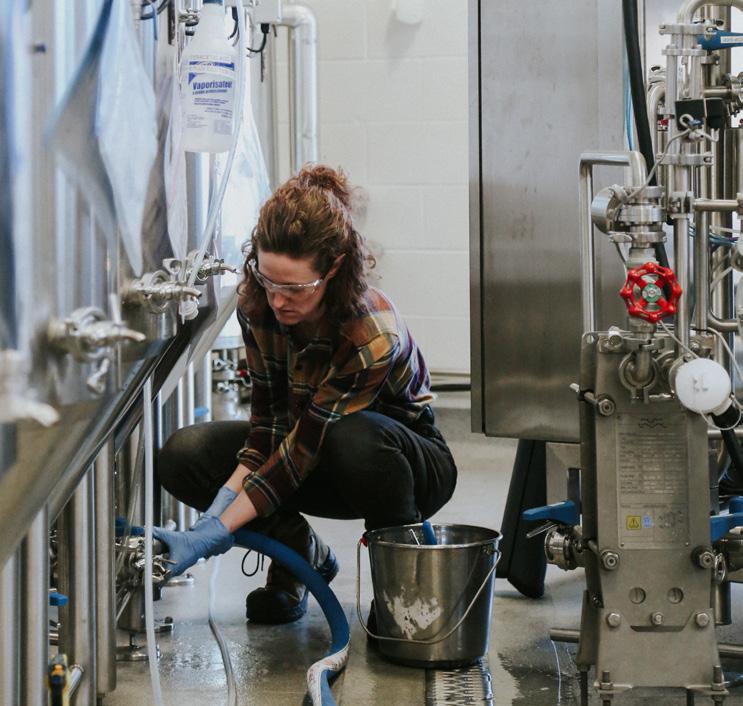
If your child loves baking, Cake Technology Management at London South Bank University is where they’ll learn skills across the discipline, from chocolate, bread and pastry production to highly technical baking chemistry.

Not a run of the mill craft and still in demand is Artist Blacksmithing, and Hereford College of Arts is the place to study it.
Who knew you could still study time!! The Horology degree at Birmingham City University teaches the specialist techniques required to design, make and repair watches and clocks.
The Perfumery diploma at the International Centre for Aroma Trade Studies will prepare your child for a career in the perfume industry!
The University of Birmingham is a global Top 100 University with a range of programmes including Business, Law, Engineering, Computer Science and Medicine. The beautiful, green campus includes three accommodation villages, state of the art facilities, and even its very own train station!
Kent’s one year MSc Ethnobotany explores the role of plants in human culture.
Floral design art and a career; one that speaks to our humanity and celebration of life. The course at Myerscough College is an amazing opportunity for those with a flair for flowers.

There’s a unique opportunity to start your medical studies in the UK and finish in the West Indies and qualify to be a doctor in the NHS! Have a look at St Georges University.
Queen Margaret University has the only degree of its kind in Scotland where you can become a qualified health care professional in Music Therapy and improve the wellbeing of your clients through music.
Sexual Health Studies course at the University of Central Lancashire delves into cultural and sociological perspectives of sexuality, design and delivery of sex and relationship education, and global perspectives of sexual health
Coventry University offers a state-of-the-art course in Artificial intelligence and human factors.

There’s a research degree for railway buffs in Scotland!! Check out High Speed Railways
Food Security is a world issue and finally it is getting global attention. I would put Edinburgh’s MSc in Food Security in the category of essential degrees.
Folded into food security is sustainable agriculture. Newcastle has a groundbreaking degree in both
Education Studies at Durham University will indulge your student’s love of Hogwarts in the second year of this degree when they consider the social and cultural context of Harry Potter and look at the reasons behind the series’ popularity.
And finally, for those seeking to add a paranormal twist to their PhD, look no further than the Parapsychology doctorate offered by the University of Edinburgh’s Psychology department. Content includes research into the pseudo-psi field, investigating ‘what’s not psychic, but looks like it’. The material will also encompass reallife accounts of the paranormal.
Did You Know? Durham University is the Sports University of the Year 2023.
The University of Exeter is one of the UK’s leading universities, combining a worldclass academic environment with an outstanding student experience.
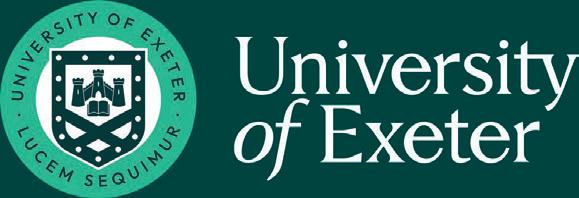
A member of the prestigious Russell Group of universities, with campuses situated in Devon and Cornwall, University of Exeter students benefit from the South West of England’s unrivalled mix of city life, countryside and coastline. Our award winning campuses are welcoming and safe, offering an outstanding study and social environment.
We have around 30,000 students, including 7,000 international students from over 150 different countries.
We’re fortunate to be based in one of the most beautiful parts of the country, the perfect place to live, study, and research. Exeter is located less than 2.5 hours by train from London, with a population of approximately 130,000 people.
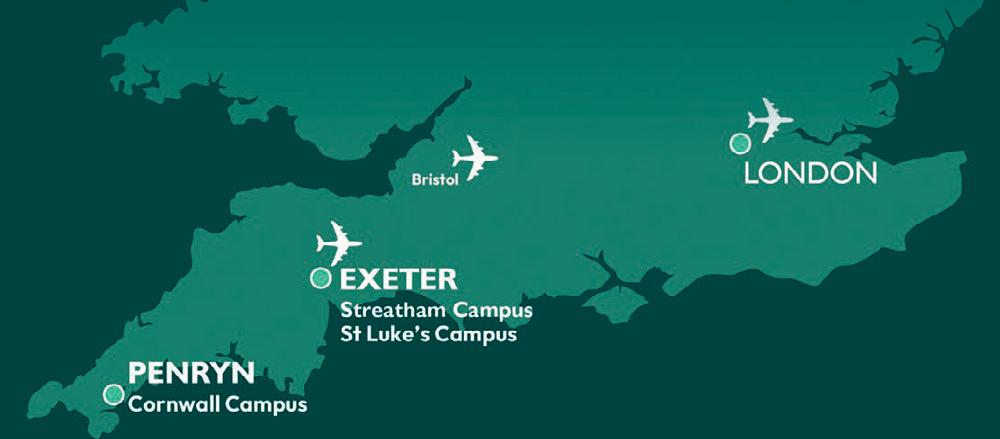
Our Students’ Guild has over 250 societies, including arts, drama and dance to recreational clubs including surfing, sailing, acapella choirs and Jane Austen. We are proud to be one of the very best sporting institutions in the UK (ranked #1 in the South of England and Wales) and have over 50 sports clubs. You can find out more about sport here: exeter.ac.uk/sport
Over 900 employer events on campus each year and an international employer network of 300+. With skills training, internship opportunities and alumni mentor schemes, we take your employability seriously.

Accommodation on campus is guaranteed for first year international students who apply by the application deadline. For virtual tours of our accommodation and prices visit: exeter.ac.uk/accommodation
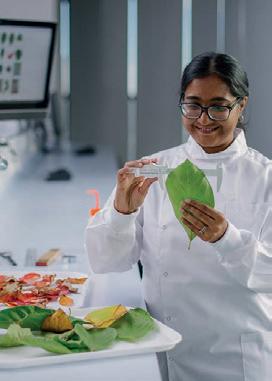 Biosciences Labs, Penryn Campus.
Number one for Action on Clean Water
Biosciences Labs, Penryn Campus.
Number one for Action on Clean Water





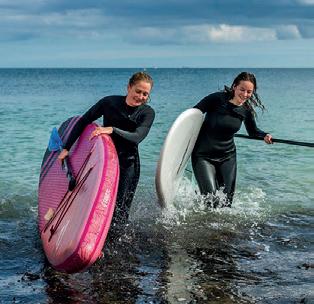




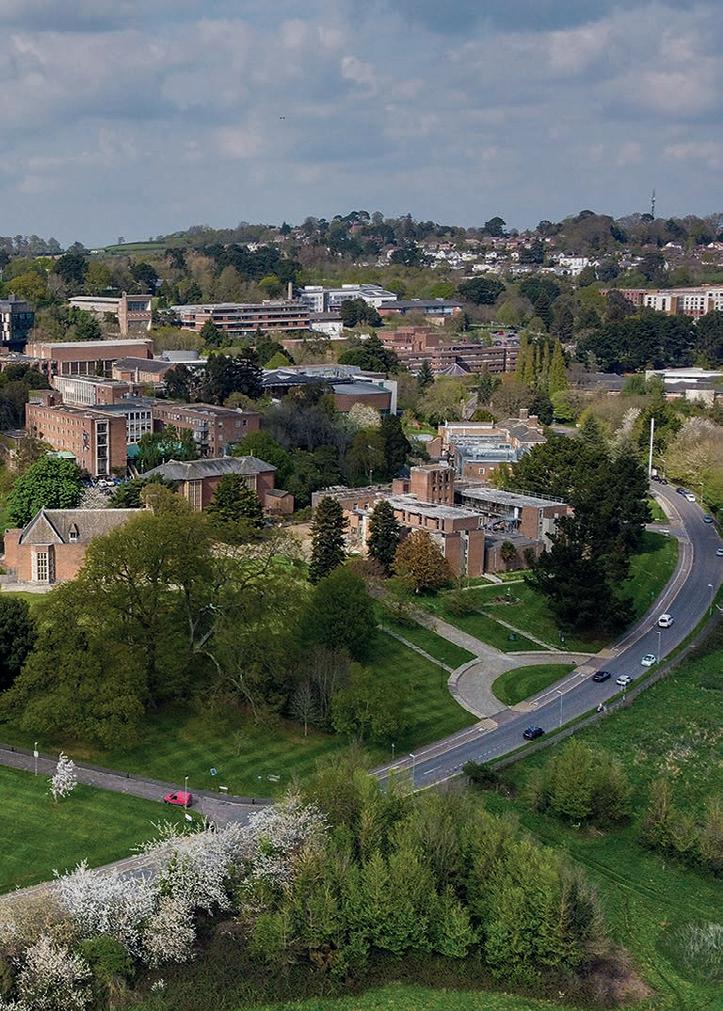
Ioften hear, “It’s only worth paying for an international degree if my child gets into a prestigious university,” i.e., one that other people recognise. This begs the question, what is the ultimate goal of the degree? For most parents, it’s helping our children toward financial independence.
I suggest a better question is: “What can I do to be a standout graduate that companies want to hire?” Or “Where can I study where I can become the best version of myself and develop the communication, networking, critical thinking skills that I need to be the best possible candidate for a job?”
In 2022, The Guardian released a report entitled “Degree grade matters more than university reputation”.
The World Economic Forum report, Future of Jobs 2020, tells us that the Top 10 Skills that employers will be looking for in 2025 are:
1. Analytical thinking and innovation
2. Active learning and learning strategies
3. Complex problem solving
4. Critical thinking and analysis
5. Creativity, originality and initiative
6. Leadership and social influence
7. Technology use, monitoring and control
8. Technology design and programming
9. Resilience, stress tolerance and flexibility
10. Reasoning, problem solving and ideation
Note that only two of these are stem related, the rest are soft or transferrable skills. This further supports the argument that it is up to the student to make themselves the standout graduate, which changes the parameters of the choice to the best-fit university for your child based on learning style, degree and lifestyle.
Without getting on my “rankings” high horse, I highly recommend making sure that you are choosing the right institution for the course that your child wants to do, and not sacrificing the course for the sake of the “name” of the institution. Prestige isn’t always important; it is relative and a factor without specific metrics.
The real “power of a degree”, in my opinion, comes with the second (specialist) degree – your child’s Master’s. The first degree is about learning how they learn best and developing those communication and networking skills; the skills in the list above that are going to take them into the next chapter of their life.

We know studies have been done, that there is a 67% chance that the jobs our children will have in 2030 don’t exist yet. If that’s the case, how could we possibly know the hard skills they need? My recommendation to undergraduate learners is: choose a degree, something that you are excited about spending three or four years studying; do well at it and get involved on campus, volunteer, do internships and work placements, study abroad – in other words, get your soft skills ready for the workforce.

Our SA unis still have some good degrees but, due to the structure of the academic year, how often do our kids come out of university with six to nine months of real work experience? How much research, especially at the undergraduate level, is available for students? What is the availability of internships, work placements, student organisations on campus that focus on their area of study?
Amongst other things, work placement and studyabroad opportunities offered in the UK university system are an integral part of building the skills this
generation needs to be productive as young adults. The northern hemisphere summers are a key time to incorporate real-world learning and experience. The job market and availability of jobs, and access to campus career resource centres geared to help in this regard are robust for UK students.
When an employer sees that a student has left their home country to go it alone as an international student, that says more about the student than the facts on paper. It tells a story of courage, resilience, cultural literacy, self-confidence and assuredness.
Employers often look to international students because they can offer a cultural perspective that local students don’t have. Does this make it easier for them in the workplace internationally? Maybe.

So, when considering the “power” of a UK degree, it’s not JUST about the piece of paper. It’s about who your child will become in the process of getting their degree. Bottom line: employment figures show that 89.1% of UK graduates are in some form of employment (based on statistics from the 2020 cohort) or education at an average salary of £30 000.
We are University of the Arts London. A place for artists, communicators, designers, makers, performers and thinkers to develop their creativity.
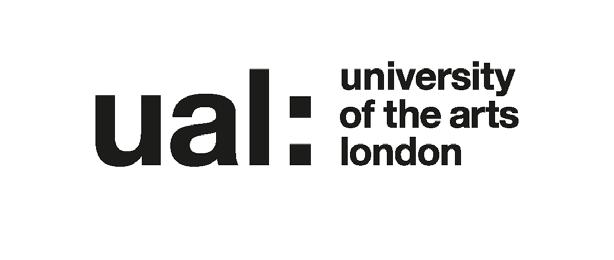
With a two-year stay back visa available in the UK for graduates, it is simple to transition from student to workforce. But how do our kids find a job after studying? There’s a clue in statistics which indicate that 64% of graduates in the UK have some form of work experience before finishing their undergraduate degree, noting that not all work experience was paid.
The best way to prepare is to dip a toe into the world of work with summer jobs, part-time jobs and work placements or sandwich years. Campus placement offices at UK universities exist to help students identify jobs that are suitable for their chosen career path, to assist with CVs, cover letters, applications or interview skills, and to find potential employers and events.
In Issue 2 of University Speaking we did an extensive article on work placements. I am so convinced about their value, that we are reprinting large sections of it here and adding a segment about study abroad.
Many universities, especially in England, have a work placement or sandwich year (taken normally between years 2 and 3) incorporated in undergraduate and some postgraduate degrees. It is one of the best ways a student can give themselves an advantage when applying for jobs in their area of study.
These provide excellent opportunities to not only gain high-level experience and insight into a job that they might occupy after university, but also to begin creating a network in their field. It also gives students the opportunity to learn more about positions available to them. Should they discover during work placement that the vocation they anticipated taking up doesn’t suit them, they have a year or more left of university in which to pivot to a focus that is more in alignment with their interests, and select different modules for their final year or make plans for a more suitable postgraduate specialty.
Having work placements on their CV before finishing university sets them apart from other students finishing with the same degree but without work experience. In addition, a large number of students get graduate jobs with their placement employer.
JENNY HYDE OF UNIVERSITY OF PORTSMOUTH GAVE US THE FOLLOWING INPUT:
• Learning to develop and appreciate relationships in the workplace and how they affect the activities of a business
• You get to learn about business practice and develop an understanding of national and international business environments
• Shows you that experience is as important as academic knowledge
• Develops your transferable skills like networking, team work, communication, and problem-solving and builds your confidence
• Gives you a jump start on building a professional network
• For international students it gives you the opportunity to see a different aspect to living overseas and perhaps even in a new city or country
• It will be easier to relate to employers in future job interviews if you can converse confidently about your previous work experience
The International English Language Testing System (IELTS) is the world’s most popular English language test for higher education and global migration. Delivered at more than 2,000 locations in 140 countries and trusted by 11,500 organisations globally, your IELTS results will open doors wherever you go. IELTS is the only test accepted by immigration authorities in the UK.
With its international reputation for excellence, you can trust the British Council to provide topnotch IELTS testing at test centres conveniently located in Johannesburg, Pretoria, Cape Town, Durban, and Port Elizabeth.

Studying in the UK is like diving into a treasure trove of opportunities. From historic universities to institutions at the forefront of innovation, from the arts to the sciences, business, and technology, you’ll find the perfect programme to meet your needs. The UK is your gateway to world-class education and unforgettable experiences.
Register here for IELTS and let your journey begin!
https://www.britishcouncil.org.za/exam/ielts
Students shouldn’t wait too long to start applying for work placements. It’s a good idea, in Year 1, or latest at the beginning of Year 2, to pop into the campus offices that offer help or services for campus jobs and to find out about companies that have provided work placements in the past.

For example, Loughborough University, one of the UK universities with the longest standing work-placement programmes, has well-established relationships with companies like Rolls Royce who have research facilities on campus. “Doing a placement offers you the opportunity to put theory into practice, experience workplace culture, build a professional network and develop your employability skills,” says Florence Mutero from Loughborough University. “That is why at Loughborough University, we offer a placement year on all our undergraduate courses.”
This uni also holds one of the UK’s largest annual Careers Fairs attended by the more than 500 companies they work with. Due to this forward focus, Loughborough has been voted as 1st in the UK for employer-student connections and 6th in the UK for graduate prospects. (For more information visit the careers network which offers advice, opportunities and workshops for our students.)
According to Jess Bower of Bath University, “Placements can last between six and twelve months, depending on the course and employer. Some students even take their placements in different parts of the world. In fact, 68% of our Bath students choose a placement or ‘study-abroad’ opportunity as part of their undergraduate degree.”
majority of students. First-year students will typically have a one-to-one with a member of the placements team to discuss their options. They will also have the opportunity to prepare by attending placement lectures and seminars, and taking part in skills sessions and mock interviews with real-life recruiters.
“During placement, students pay a reduced tuition fee to the University instead of the full year’s fee. Some placements are paid, meaning that some students earn a salary while they work,” Jess adds.
Many UK universities offer study-abroad programmes. Given their four-year degrees, the Scottish universities have robust study abroad programmes.
If your degree path is history, art, international business, international relations, languages, study abroad adds to your marketability after university. Remember that companies are looking for employees with a full set of skills – not just hard skills, but the ability to be flexible and adaptable and understand global perspectives and cultural diversity. All of these can be gained with a period of study abroad.
When an employer sees that a student has spent a year in a country, certainly a country that has a significantly different language or culture, it tells a story about the student that goes beyond the fact that they did a study abroad year.
Prospects recommends that students “should begin researching your study abroad experience 12-18 months before you actually travel – doing so will give you plenty of time to sort out applications, funding, visas and more”.



I was attracted to Durham because of its history and small, intimate nature. My college is like my family and I love feeling part of something bigger than myself.


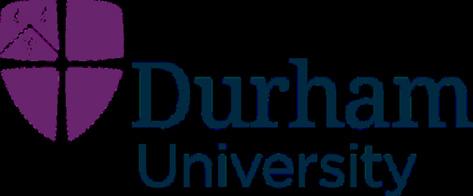 Chloe Hayes from South Africa Law
Chloe Hayes from South Africa Law
Our university is a globally outstanding centre of teaching and research excellence in the UK.
Join a diverse community of 20,000 students in 17 unique colleges. Study next to a UNESCO world heritage site with world-leading researchers. Become part of a global network of 215,000 alumni in over 185 countries Find out more here.

Across our four faculties of Arts & Humanities, Business, Science, and Social Sciences and Health, our courses are designed to help you reach your highest potential.
Sport is at the core of Durham student life, find out more here.



78th in the World 2024
50th in the world for employer reputation


Sports University of the Year 2023
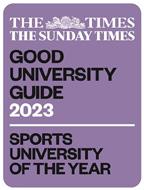
In today’s world, it is the responsibility of educational institutions to prepare their graduates for the realities of the workplace – and universities that are equipped to provide a multinational education for their students play an essential role in this.
International partnerships connect educational institutions on a worldwide scale. Establishing institutional-to-institution partnerships can help establish and enhance an aspiring doctor’s educational journey and professional opportunities.
For example, since 2007, St. George’s University School of Medicine (SGU) and Northumbria University (NU) in Newcastle upon Tyne have collaborated to provide students with the opportunity to start their journey to becoming a doctor in the UK. This allows them to exchange ideas with fellow students from different places and build maturity through living in multiple foreign countries. This can encourage flexibility and positive reactions to unexpected outcomes – a regular occurrence in the life of a doctor. Exposure to multiple international education systems can also help to develop the right attitude to approach the practice of Medicine.
Due to the collaboration between St. George’s University and Northumbria University, students may enrol in a four-year Medical Degree program or a fiveor six-year MD pathway. The pathways build on an existing academic background in science with entry-level medical degree coursework in anatomy, physiology and other foundational sciences, whilst the MD Program is designed to assist students develop knowledge and clinical skills while also giving them the opportunity complete clinical rotations across healthcare systems in both the UK and the US.
This collaboration has welcomed more than 2,000 medical students to Newcastle upon Tyne, UK. Students on the UK pathway experience small group discussions designed for problem-based learning with preparation for standardised exams such as the Professional and Linguistic Assessments Board (PLAB) and UK Medical Licensing Assessment (UKMLA). Having this focus on UK-based examinations, whilst studying and living in the same country, helps to add an additional level of clarity to the curriculum.

Students also have the privilege of spending one academic year at SGU’s modern campus in Grenada, in the Caribbean. This complements their global educational paradigm by allowing students to learn and practise Medicine in a variety of settings.
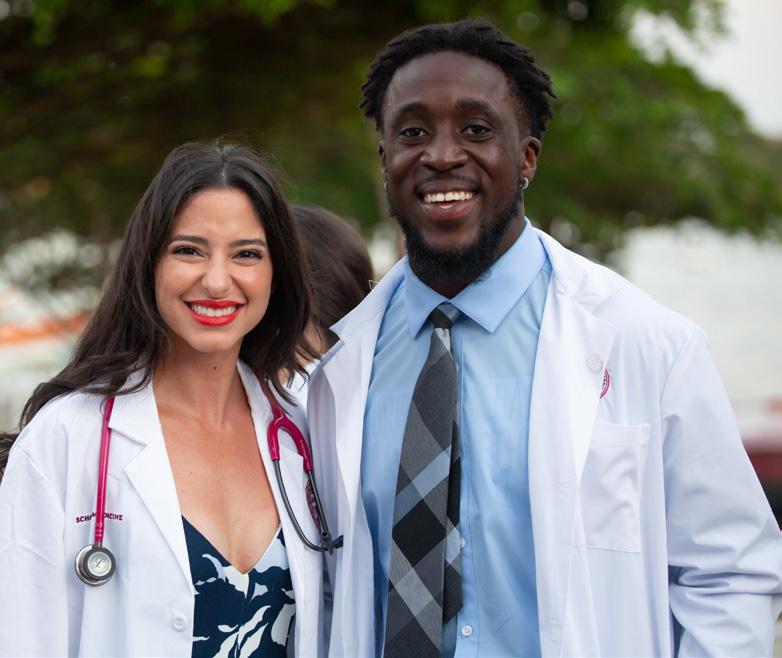
Lectures, labs, textbooks and exams follow the same evidence based, clinically integrated curriculum to ensure students continue to experience a rewarding education with global impact, no matter their location.
In addition to academic learning, in the final two years of the four-year MD program, clinical training helps students be more responsible, accountable and compassionate. At SGU, students complete their rotations in over 75+ affiliated hospitals and health centres in the US and UK
Exposure to multiple healthcare systems can help establish and enhance an aspiring doctor’s educational journey and professional opportunities. This approach allows students to develop maturity through living in multiple foreign countries, and students can learn to be more flexible and react positively to unexpected outcomes.
A doctor’s job is not only to treat patients, but also to help make society a better place by understanding diversity and inclusion. SGU encourages students to pursue this goal throughout their careers. This attitude allows students to be better students, and doctors to be better doctors as a result. The evidence speaks for itself. According to FSMB physician licensure data for 2021, St. George’s University is the leading source of physicians licensed in the US, producing more than any other Medical School in the world.
The objective of the SGU/NU MD program and pathways is to enhance and strengthen a graduate’s profile. The partnership was formed to assist students in becoming well-rounded clinicians, enhancing their educational journey, and expanding employment opportunities.
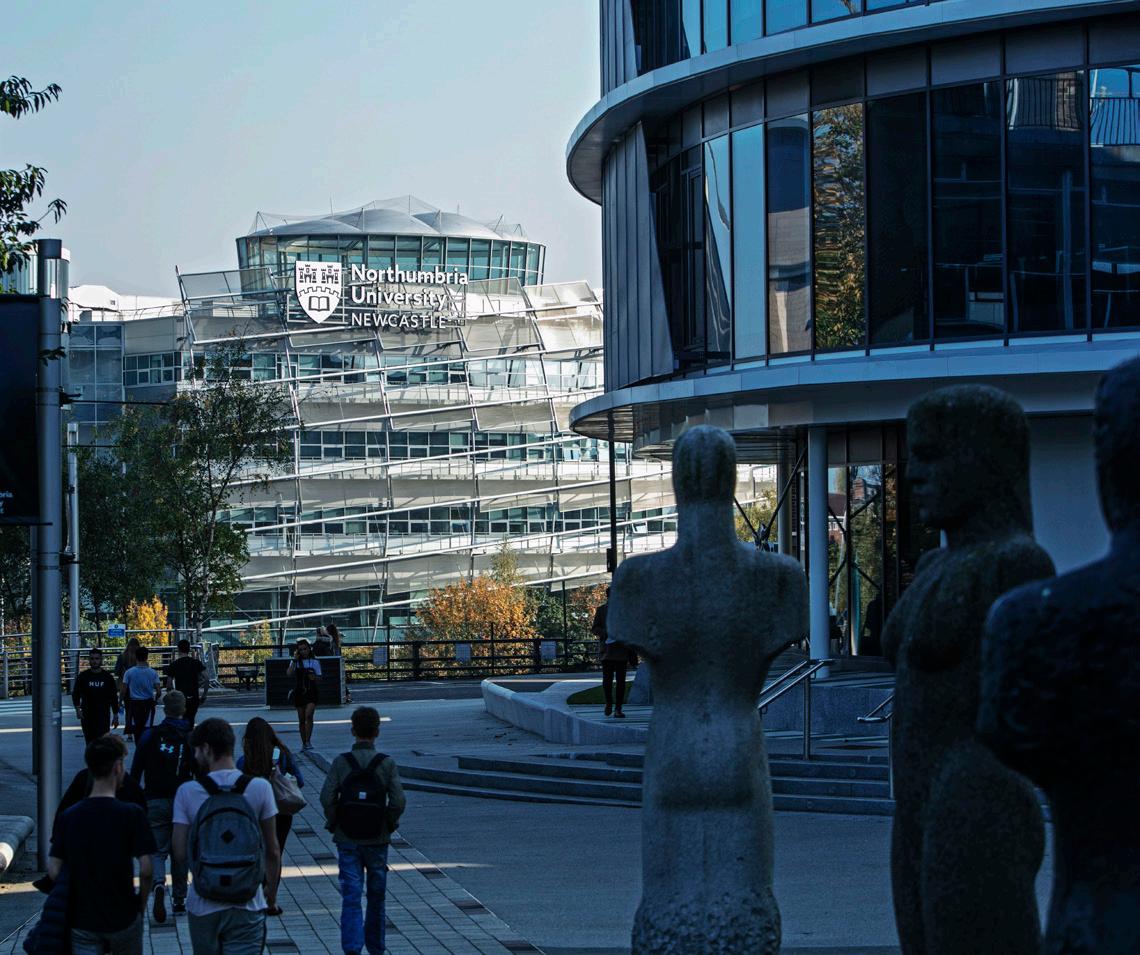
SGU IS THE LARGEST PROVIDER OF DOCTORS INTO FIRST-YEAR US RESIDENCIES FOR THE LAST NINE YEARS. OVER 1,000 US RESIDENCIES IN 2023.*
FIND OUT MORE
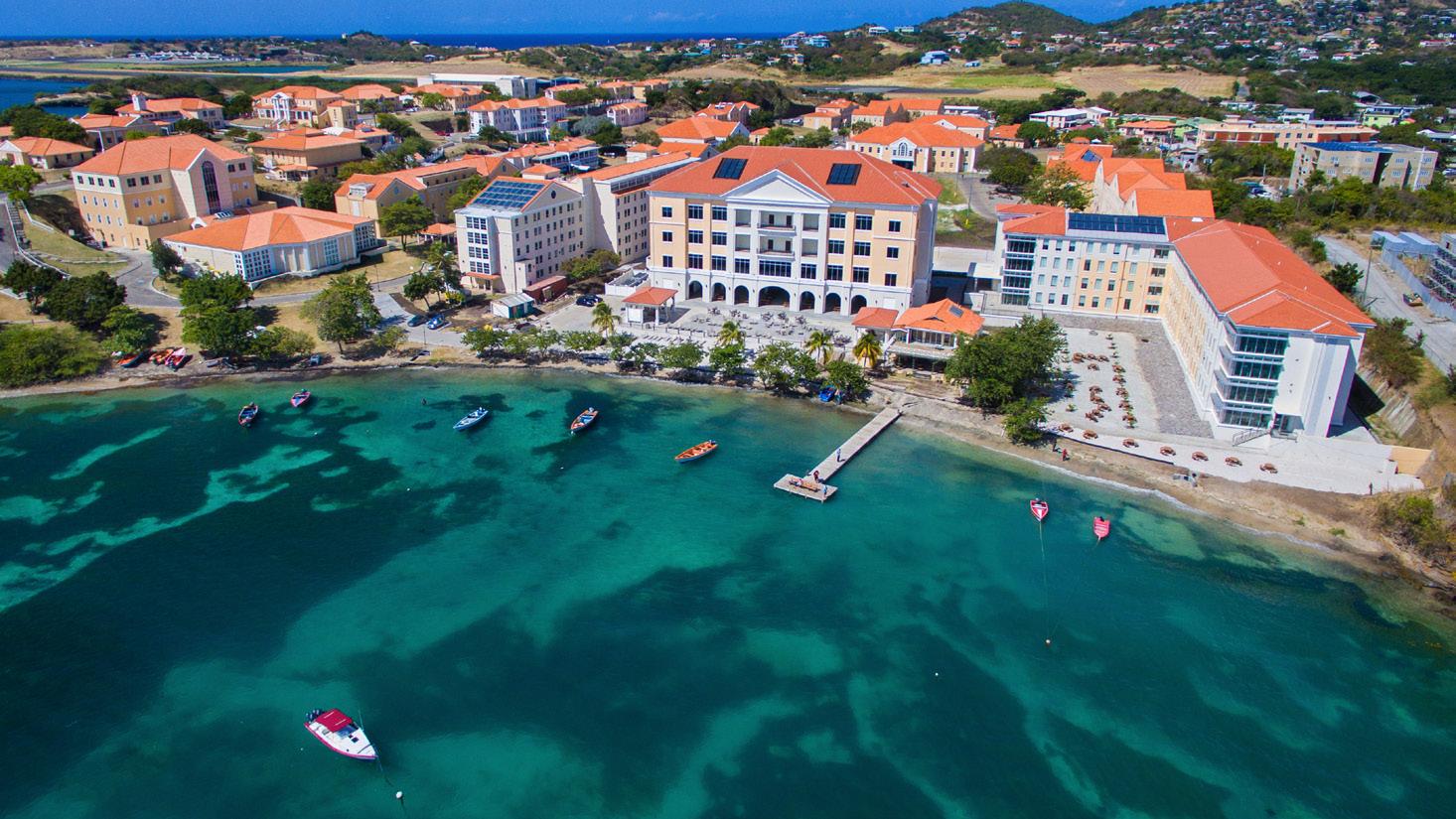 *As the medical school graduating the largest number of students per year, SGU places the largest number of graduates into residency programs each year, based on internal SGU graduate/expected graduate and residency placement data as of June 2023.
NORTHUMBRIA UNIVERSITY CAMPUS IN NEWCASTLE UPON TYNE, UK
ST. GEORGE’S UNIVERSITY CAMPUS IN GRENADA, IN THE CARIBBEAN
*As the medical school graduating the largest number of students per year, SGU places the largest number of graduates into residency programs each year, based on internal SGU graduate/expected graduate and residency placement data as of June 2023.
NORTHUMBRIA UNIVERSITY CAMPUS IN NEWCASTLE UPON TYNE, UK
ST. GEORGE’S UNIVERSITY CAMPUS IN GRENADA, IN THE CARIBBEAN
Once you’ve navigated the maze of applications, with any luck you will get a notification telling you your DS or DD (Darling Son/Darling Daughter) has been accepted! Happy Day! But … there’s much to be done, before your child sits down in his first lecture. Or, in typical First Year Fashion, lifts their first beer.
1.
STUDENT VISAS FOR THE UK:
If your child is lucky enough to have a UK passport, scroll past this point! You might have to pay full whack but this point does not affect (lucky!) you.
For everyone else, your child is eligible for a student visa if they have been offered a place on a course in a registered institution, have enough money to support themselves and pay for the course (you will have to provide proof of this), and can speak, read and write and understand English.
Applying for visas is straightforward and the Home Office website is clear and efficient. The process is even easier if you are applying to a university represented by an agent like Global Education, they can help you with your visa free of charge.

2.
OPENING A BANK ACCOUNT AS A STUDENT IN THE UK:
Every student and parent I know recommends choosing a bank by deciding which are the best for points and student discounts. Ensure your student does their research!
STUDENTS CAN OPEN AN ACCOUNT WITH THE FOLLOWING:
• Identification, such as a passport or ID card (including a visa, for overseas students)
• Proof of a UK address, which can be their room in halls, a utility bill or a tenancy agreement and proof they’re a student, which can be their offer from the university, concerned.
• Some banks like HSBC allow accounts to be opened before your student leaves home. Nationwide allows you to apply up to five months before the course starts. This can be a great help for nervous or inexperienced First Year. My boy is with Mondo and has found them excellent.
Whatever success means to you, Portsmouth is your place to achieve it.
• Scholarships up to £3,000
• Support from the Careers and Employability Service for up to five years after graduation
• 24/7 campus security team
• Dedicated support for international students

• Access to a newly built £57m sports centre
• City campus located on the UK’s south coast
• Guaranteed place in University halls of residence*
• January start dates for some courses
Discover more about Portsmouth

• Accounting, economics and finance
• Architecture and surveying
• Business, management and marketing
• Computer games, animation and digital technologies
• Computer science and software engineering
• Earth and environmental sciences
• Engineering
• Healthcare and social care
• History, politics and international relations
• Law
• Psychology and sociology
• Sport science
Emily Chepkosgei, Regional Officer (East and Southern Africa)
E emily.chepkosgei@port.ac.uk
M +254 726 490347
T +254 745 383 115
W www.port.ac.uk
Find out more about our subject areas and our entry requirements.
3.
HALLS:
I can’t recommend strongly enough staying in halls (of residence, SA’s “res”) for the first year. For a youngster, far from home, the camaraderie, security and simplicity of living in halls is just the best way to start. Halls buddies are often buddies for life.

If your child decides to make use of their university’s provision, they’ll find that they can usually start their accommodation application once they’ve accepted an offer on a course – but check with the university for details of the process. There are many options (shared rooms, catered, uncatered…). Start the process of applying as soon as possible, as popular room types do go quickly.
4. HEALTH:
Again, this is much simpler if your student has a British Passport, as once they have their National Insurance (NI) number, they can just register with a local NHS dentist and GP - (make sure they register before they get, as they most certainly do, their first Halls Flu.)
If your child is not British, you will need to pay the NHS healthcare surcharge to ensure they can access the NHS.
uni advice a year ago. She said: “You may (or may not) be surprised to hear that SA is no longer considered to be a native English speaking country – only 8% of South Africans have English as a home language.
“The UK accepts your level of English as sufficient if you obtain a C average in matric for English first language. If not, IELTS or TOEFL test required, or a foundation year.”
IELTS is an English language test for study, migration or work. Your student’s ability to listen, read, write and speak in English will be assessed during the test. IELTS is graded on a scale of 1-9.
YOUR HEART. THEIR HEART:
Nothing can prepare you for the horrible feeling as their plane takes off and your heart sinks. Sending even one child overseas changes a family. It is the end of one phase and the beginning of another.
You will be devastated, but you will get used to it. You will delight in their progress, in their growth and their opportunities. They will have down times and will skid and stumble. Then they’ll soar. They will come back and leave again and life will go on.
Sending your child overseas to study is expensive, heartsore and wonderful. You are giving your child the keys to the world.
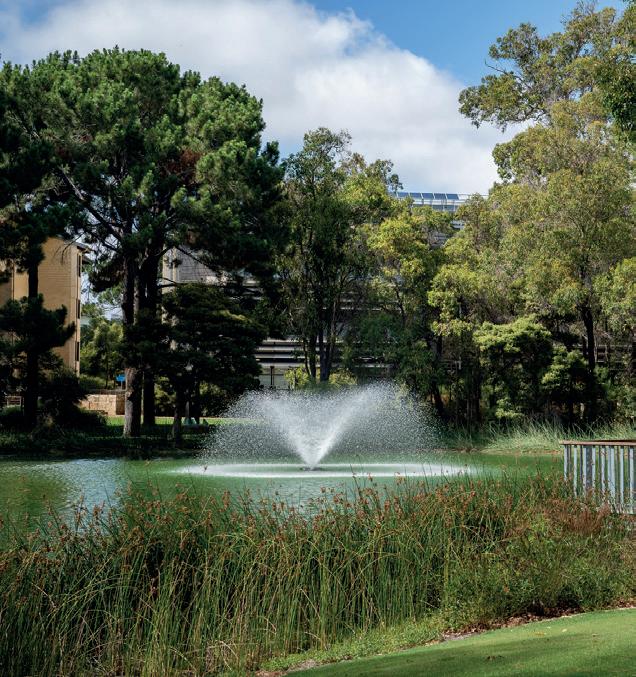
A dual degree allows you to gain two degrees in less time than it takes to study them separately.
You will study at two universities and benefit from teaching expertise, the latest research and facilities in both institutions. With a University of Portsmouth dual degree you will also study at Edith Cowan University in Australia.
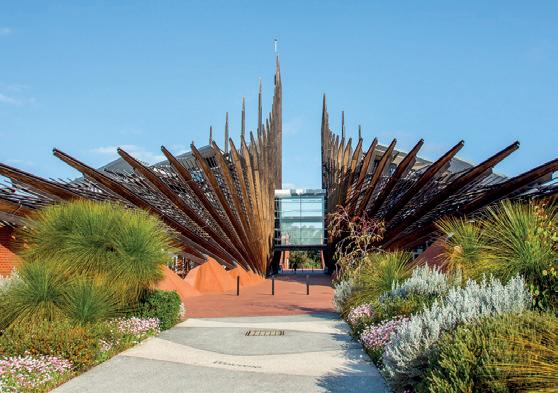
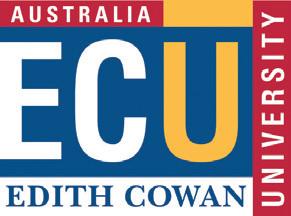
You will:
• experience different cultures
• graduate with two degrees
• develop your subject knowledge with experts from two countries
• build a global professional network
• grow in confidence and gain a new sense of independence
• gain a competitive edge in the global job market after graduation COURSES AVAILABLE:
• BA (Hons) Global Communication and Media
• BSc (Hons) Counter Terrorism, Intelligence and Cybercrime
• BSc (Hons) Environmental Science and Management
• BSC (Hons) Global Sport Management
• BSc (Hons) Sport, Health and Exercise Sciences
• BSc (Hons) Biomedical Science with Human Biosciences
Find out more at www.port.ac.uk/dual-degrees
If you are deciding between studying in the UK and Australia, this could be the right choice for you.
UP TO £4000 SCHOLARSHIPS AVAILABLE



The University of Hertfordshire is located in the town of Hatfield, just 25 minutes by train from London Kings Cross. Our 125-acre green campus allows you to live, study, and socialise within easy reach of London. Across our 6 prestigious Schools of Study, we offer over 300 programmes.
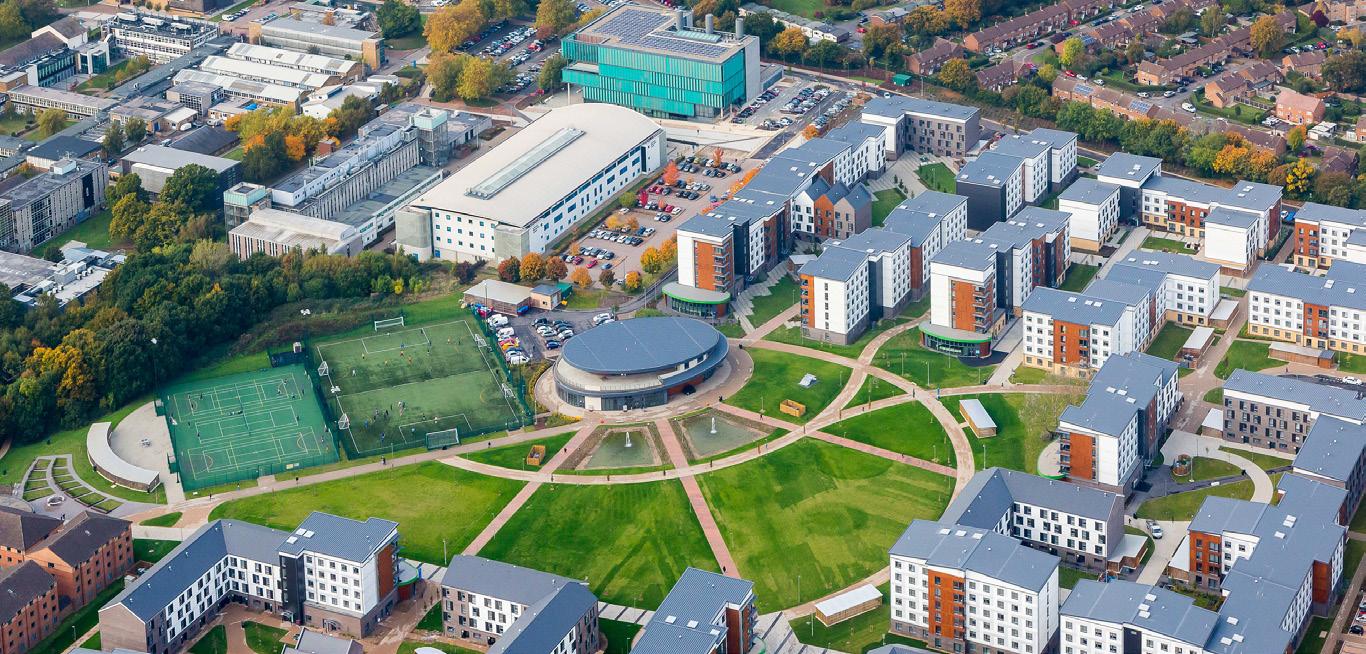
Rankings
in the world for Games Design and Development

Complete University Guide, 2022
1st 1st 1st 1st
in the UK for Creative Media & Entertainment Rookie Awards, 2022
in the East of England for Aeronautical and Aerospace Engineering Complete University Guide, 2023

Schools of Study
Hertfordshire Business School

School of Creative Arts
School of Health and Social work
in the UK for Paramedic Science
The Guardian, 2023
School of Life and Medical Sciences
Hertfordshire Law School
School of Physics, Engineering and Computer Science











• Changing the world since 1451
• World top 100 University
• Member of the prestigious Russell Group
• World top 20 for sustainability
• Located in Scotland – in the world’s friendliest city (Time Out, 2022)
Our students of today are the world changers of tomorrow – join us: glasgow.ac.uk.
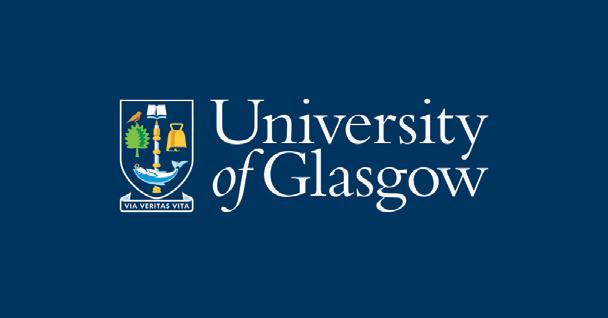

• More than 300 clubs & societies
• Over 50 student sports clubs
• State-of-the-art sports facilities
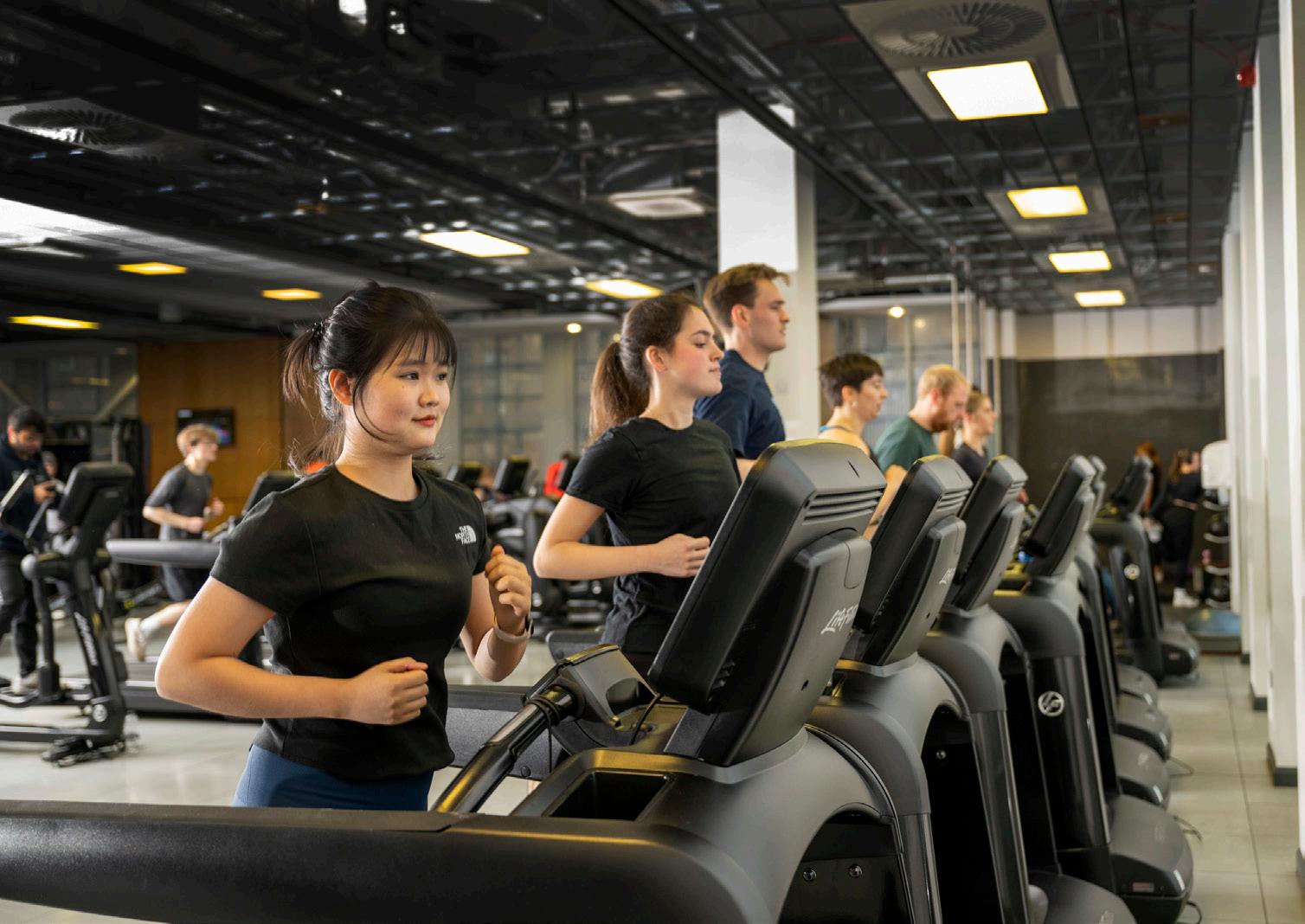
• Flexible, four year undergraduate programmes

• Degrees offered in arts, humanities, social sciences, sciences, engineering, business and more
• More than 300 postgraduate degrees
• Merit-based scholarships for each year of study

According to a survey by the Scottish government, 94% of international students in Scotland said it was a good place to be, and 86% of Scottish students would recommend it to others.
The Scots are known for their friendliness and humour. The country has a low crime rate and the climate is considered “temperate”, though winters can be freezing for SA students (which is an experience in itself).
It boasts some of the most beautiful landscapes in the world, dotted with castles and keeps, with loads of opportunities for outdoor adventures, from white-water rafting and skiing to mountain biking and hiking.
And, of course, some of the major European cities are right on Scotland’s doorstep. London is less than an hour’s flight away and Paris is less than two, so your child will be able to broaden their university experience with travel to the best sites and sights of Europe.

The calendar is full of exciting events, with more than 350 festivals every year, including the TRNSMT Music Festival.
Scotland has a rich, diverse history and a distinct culture that differs considerably from the rest of the UK. Long before Brexit or the UK/EU recognition as an EEA unit, Scotland considered itself European and it has the highest concentration of universities in Europe.
It is an incredible destination to visit and a phenomenal place to study. Besides world-class universities, the culture and the breathtaking scenery, there’s the…
LOCHS:
Scotland’s freshwater lakes, called lochs, are great for locals and tourists. Who has not heard of Loch Ness?

THE LOCH NESS MONSTER
– one of the most famous mythical creatures in the world.
WHISKY!
130 distilleries produce 1 billion bottles a year. That’s 10 bottles for every man woman and child in the country – not to be confused with Irish whiskey that is aged 1 day longer than Scottish whisky.
SCOTTISH WOOL
– the envy and revered yarn for every knitter, because there are so many sheep in Scotland.
TARTANS AND KILTS
– symbols of Scottish heritage originally worn as a type of clothing by the Highland clans.
THE EDINBURGH FRINGE FESTIVAL AND EDINBURGH CASTLE
- the Edinburgh Fringe Festival, originating in 1947, has become the largest arts festival in the world. One of the most famous castles globally and a top Scottish tourist attraction, Edinburgh Castle was home to Scottish royalty and is perched atop an extinct volcano.
BAGPIPES
– the pipes have become a recognised symbol of Scottish Culture though there is some debate as to their origin. For now they are associated with kilts and tartan and are one of the most recognisable symbols of Scottish culture.
HIGHLAND COWS
- the cutest cows on the planet.
GOLF – South Africa is five times bigger than the entire UK, yet Scotland alone has 20% more golf courses, numbering 550!
INVENTIONS
- let’s not forget that some of the inventions that have shaped our world are attributed to Scotland or Scottish inventors. Take just six: TV, the ATM machine, Dolly the sheep – first cloned mammal, telephone, steam engine, full body MRI scanner …
Edinburgh Napier University has a fully student run radio station called Radio ENRG (pronounced energy) which gives all students the opportunity to show off their talents in the form of music, storytelling, comedy, presenting etc.
... that the University of Stirling is Scotland’s University for Sporting Excellence? Did you know that Stirling will offer every successful South African applicant a four-year undergrad scholarship valued at £20 000, effective from September 2024? We spoke to Capetonian, Marketing Director, Lisa Wilkisky-Dick to find out more.
LISA WILKISKY-DICK DIRECTOR OF MARKETING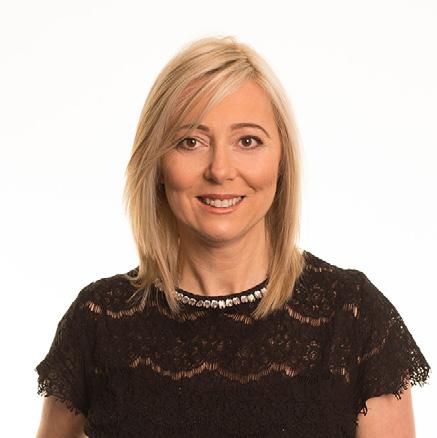

A: The Scottish degree is four years. We pride ourselves on the fact that, in the main, the first two years of study are very broad. Say a student wants to study English. In each semester of Year 1 and 2 they would choose three subjects, one of which must be their core subject, i.e. English, but the other two subjects can be whatever they choose to study – maybe Sport, Psychology, a language, Business or Marketing. If they enjoyed Business, they could take another Business module in Semester 2 along with English and a third module. The great advantage is that if they discover they’d much rather continue with Business instead of English, they can switch. Or, they could do both subjects as a combined honours. (Of course there are some degrees where this isn’t possible)
A: Yes. I was astounded by the number of students who came up to me when I visited Stellenbosch, asking about doing an honours year. Apparently only a small number of students are admitted to South African honours programmes, whereas the honours year is part of the Scottish four-year degree. I’ve been speaking to our admissions teams and it may be possible for South African students to join Stirling to complete their third and honours with us. This would be considered on a case by case basis, to ensure that the student had the right credits to progress.
Our INTO partners, a global brand with buildings on our campus, offer Pre-Masters courses, enabling SA students who don’t have honours to progress to Masters after completing the Pre-Masters. INTO Stirling also offers degree progression for those students who don’t have the grades they need to get into their undergrad degree – they can come for six months or a year and then progress directly into second or third year (depending on the course).
A: We acknowledge the cost implications with the exchange rate, and we offer South African Scholarships from September 2024. Any South African who applies successfully for undergrad entry will receive £5 000 per year of study off their tuition fees. That’s a £20 000 scholarship over the four years, which more than covers one year’s tuition fee.
There are also smaller, sports-specific scholarships for elite level athletes, mainly for tennis, swimming, football and triathlon.
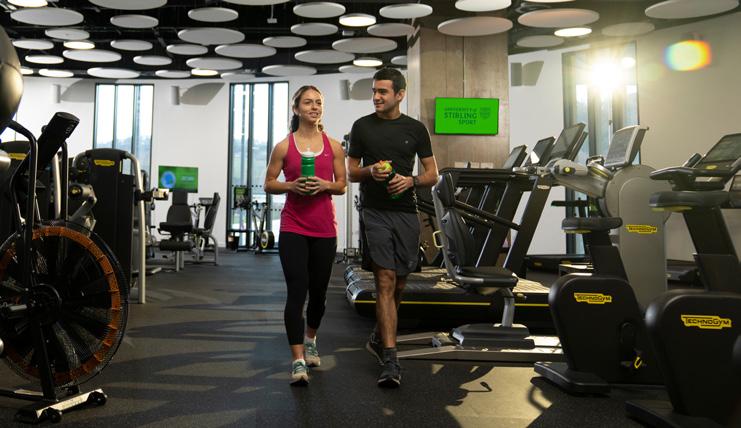

A: Yes, one of the things that sets Stirling apart and makes it particularly attractive to a lot of South African families is that we’re Scotland’s University for Sporting Excellence. We have over 50 different kinds of sports clubs and societies. We have a golf driving range, football pitches, hockey pitches, athletics, rugby fields, cricket, and a 50 metre pool – you name it. Many of our elite athletes are Commonwealth and Olympic gold medallists.
A: We don’t have the same issue as we have a large number of rooms on campus and in the city, and can guarantee international undergrads and postgraduates a place for first year. There are some older units in halls and then there are also beautiful modern rooms with stunning views – Wi-Fi, gas and electricity is included, as is 24-hour security (though Stirling is one of the UK’s safest cities) – and also one of the UK’s Happiest Cities! There are also four private providers of student accommodation in the city.
A: Stirling is Scotland’s smallest city, with a population of around 95 000, of which 18 000 are students. I think the closest equivalent in South Africa would be Stellenbosch. We are in central Scotland, 30 minutes from Glasgow and 50 minutes from Edinburgh. It’s not as cold as everybody thinks but between December and March you need layers and a really good, warm jacket. There’s a likelihood of snow and a lot of our students go skiing at Aviemore or Fort William, which is about two hours away.
The University itself is set on a 330-acre campus with a loch (lake) in the middle of it. Everything is on campus: the sports facilities, student accommodation, we’ve also got lots of coffee shops, restaurants, a cinema, a theatre, a supermarket, hotel and a gym.


You don’t have to leave campus but of course the students do, and they can walk to the city in 15 minutes, borrow one of the bicycles we have around campus, or take a bus and be there in 5 to 10 minutes. All buses are free for anyone under 22, which also makes exploring the rest of Scotland affordable.
I moved from Cape Town to Stirling 25 years ago. It’s a very welcoming and friendly place, and with more than 120 clubs and societies it’s easy for international students to meet people and make friends.
Extraordinary opportunities
Access to sport scholarship funding, elite athlete accommodation and our elite athlete access policy.
We’re Scotland’s leading sporting University and consistently ranked in the top 5 universities in the UK for sport.
Extraordinary success
We have a track record of supporting athletes to success on the Olympic, Commonwealth and World stage.
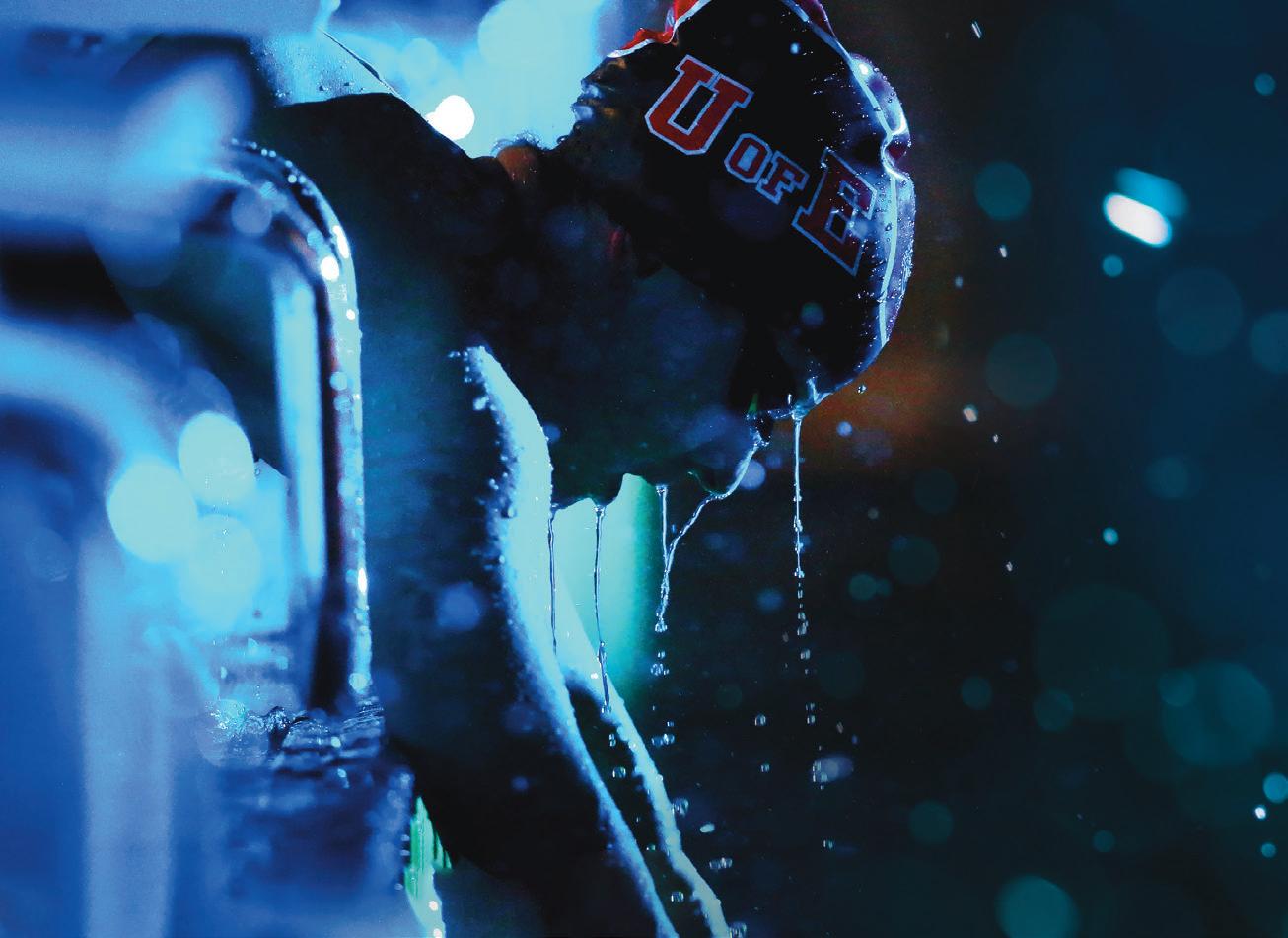
Join the University of Stirling, Scotland’s University for Sporting Excellence.
£20,000 undergraduate scholarships available
Virtual Open Day
4 October 2023
Book today: stir.ac.uk/openday
“I’ve made friends with people from all over the world. Everyone is welcoming here and willing to help out whenever you need it.”
 Pamela Nxumalo South Africa BA (Hons) Film and Media
Pamela Nxumalo South Africa BA (Hons) Film and Media

Generally, the Scottish system takes an early, broad learning approach incorporating varied knowledge and experience, with some similarity to the US higher education system. The English and Welsh universities focus on a deep learning of a specific subject. Judging one as better than the other is shortsighted; each system has its merits.
The are over 52 000 international students from 180 countries studying in Scotland. One measure of success in any educational system is student satisfaction. Scotland’s is the highest in the UK. Every Scottish university has student residences and new students get priority.
Typically, Scottish bachelor (honours) degrees (excluding medicine, dentistry and vet medicine) are four years long as opposed to three years for English/Welsh degrees.
You may notice that the designations for degrees are a little different at Scotland’s ancient universities. MA, Master of Arts (not to be confused with the postgraduate Masters of Art), is an undergraduate course designation for an honours level degree (four years) in the arts and social sciences at University of Glasgow, University of Edinburgh, University of St Andrews and University of Aberdeen.
Did You Know?
Scotland’s degree structure offers breadth in early years of study, potentially allowing for exploration of a variety of subjects, depth in later years in subject(s) choice, flexibility to explore and change degree subject and study abroad plus year in industry options.
The Scottish unis have specialties ranging from gaming to astrophysics to international relations and law to fine arts. The variety is vast. They also use the UCAS system for applications like all of the other UK universities.
Scottish universities have high graduation rates, meaning most students finish their degrees. Graduate employability is also very high with 75% in graduate jobs, and if you include graduates progressing to another degree, it jumps to almost 90%.
• Tuition Fees vary by institution (typical range £12 000 – £25 000)
• Cost of living is usually around £10 000 – £13 000 per year – lower than in many other UK locations
• NHS Surcharge (Healthcare) – around £500 per year
• Scholarships: see individual institution websites and watch for The Village Scholarship Newsletter coming in late 2023! University of Glasgow for instance offers a £7 000 undergraduate excellence scholarship and other scholarships for postgraduate study.
The Bright Red Triangle is Edinburgh Napier University’s enterprise hub and has supported over 700 student in starting their entrepreneurial journey.




• University of Aberdeen university in the UK and 3rd in Scotland, and the first chair of medicine in the English speaking world – health and healthcare are a research priority
• Abertay University – specialist university with internationally recognised tech-driven degrees such as Ethical Hacking and Computer Games
• University of Dundee – recognised as a global centre for life sciences and medicine
• University of Edinburgh (ancient, Russell Group) – ranked top 50 in the world – world renowned for arts, humanities, social sciences while also excelling in medicine and veterinary science


• Edinburgh Napier University (modern university) – top 5 in the UK for Communications and Media Studies, Drama, Dance, and Cinematics while also specialising in cyber-security and digital forensics. The School of Nursing, Midwifery and Social Care is the leading trainer of nurses in Scotland
• University of Glasgow (ancient, Russell Group) – 2nd oldest university in Scotland, top 100 world ranked university recognised for its world-leading research expertise in history of art, veterinary medicine, cancer studies, accounting and finance – also a leader in sustainability
• University of Highlands and Islands
• Heriot-Watt University - specialises in Business, Science, Technology, Engineering, Mathematics and Fashion Textiles – subjects which make a real impact on the world and society
• Queen Margaret University – renowned for immediately relevant research and innovation, it is widely recognised for expertise in business, the creative industries, education, health and rehabilitation, and social sciences
• Robert Gordon University - strong focus on vocational degrees, and brands itself as “The Professional University” with degrees in sustainable transport, built environment visualisation, industrial biotechnology, smart data and artificial intelligence, and pharmacy practice.
• University of St Andrews (ancient) – 1st university in Scotland, currently ranked as the best in the UK for Classics, International Relations, History of Art, Geography, Economics and Physics
• University of Stirling more than 30% international, home to Scottish swimming and tennis, and Scotland’s University for Sporting Excellence, a designation by the Scottish Government. 80% of the research is world leading. Degrees in communications, media, education, philosophy and psychology are in the
- has a triple accredited business school (AMBA, AACSB and EQUIS) and one of the largest and best equipped engineering faculties in Scotland. The Technology and Innovation Centre on campus is home to companies such as GlaxoSmithKline, AstraZeneca, SSE, Scottish Power and the
University of the West of Scotland – five campuses (four in Scotland, one in London) and five academic schools: Business and Enterprise; Computing, Engineering and Physical Sciences; Education; and Health and Life Sciences
Did You Know?
Located in Edinburgh, vibrant historical capital of Scotland.
Courses are designed in consultation with business and industry for excellent employability.
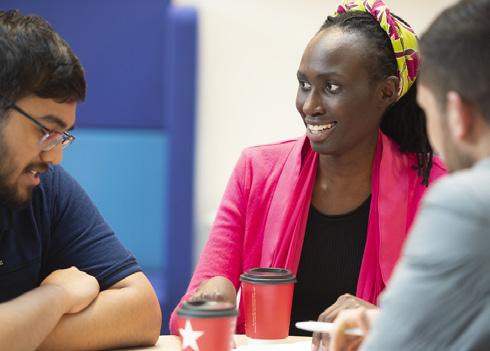
Scholarship for South African students.
Honours year/ 4-year bachelor degrees. 3 campuses throughout the city.
#1 modern university in Scotland
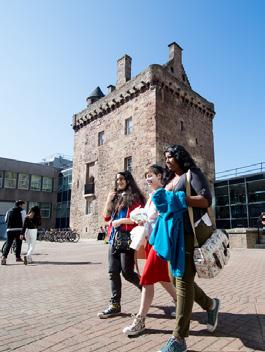
#1
150 nationalities +
230 + undergraduate and postgraduate courses TOP

AFutureproof your career with one of Abertay University’s hands-on courses, crafted and delivered by leading academics and industry experts. Based in the heart of beautiful Dundee on Scotland’s east coast, we empower students to thrive in global industries and adapt to modern job demands through our blend of academic knowledge and real-world experiences. We take pride in shaping you to be a ‘work-ready’ professional as soon as you graduate and to feel well prepared, wherever you choose to belong.
Undergraduate, postgraduate, research and online courses available in a range of subject areas:
SCHOOL OF DESIGN AND INFORMATICS
• Game Art and Design

• Game Technologies

• Cybersecurity
• Computing
SCHOOL OF APPLIED SCIENCES
• Sport and Exercise Sciences
• Health Sciences
• Forensic Sciences

• Psychology
• Engineering
• Food Science
SCHOOL OF BUSINESS, LAW AND SOCIAL SCIENCES
• Business
• Marketing
• Accounting
• Law
• Criminology
“When looking to study games overseas, the place that instantly grabbed my attention was Abertay University. One of the leading institutes worldwide in game development studies, I instantly fell in love with not just the quality of the course, but also the wonderful lifestyle they offer to their students. If you have an interest or hobby, you will probably find a fun group to join, and the support system provided to their students is world class. Coming over to a new country can be a daunting affair, but I can honestly say that Abertay made the transition smooth and enjoyable with their supportive staff and friendly community. I can’t recommend Abertay to prospective students enough.”
Sources: * Guardian University Guide 2023, ** Times and Sunday Times Good University
• International Scholarship of up to £12,000 for all South African students

Teaching Is Everything
• UK Top 25 for teaching and Course Satisfaction*
• UK Top 20 for Teaching Quality*
We’re World-Renowned For Our Computer Games Education
• First in the world to offer courses in Computer Games

• Global top 20 for undergraduate Video Games Education***

• Top 10 in the world for Postgraduate Courses
• Gold-standard accredited Courses


We’re Leading The Way In Cybersecurity
• First in the world to offer Ethical Hacking course
• Scotland’s only university to have achieved gold level Academic Centre for Excellence in Cyber Security Education status – an accolade awarded by the National Cyber Security Centre which is part of the UK’s Government Communications Headquarters (GCHQ)
Dundee – A Home From Home
• A friendly and compact city
• Officially the sunniest city in Scotland
• The UK’s only UNESCO City of Design full of cultural hotspots and multicultural communities
• Scotland’s student city, with 40,000 students making it a fantastic place to experience university life
If you have any questions, please get in touch with Linda McHugh, Senior International Officer:
E: l.mchugh@abertay.ac.uk
#BeAbertay
University Guide 2023, *** The Princeton Review 2022








If you have a bachelor’s degree, you don’t need an honours degree in order to study postgraduate degree preparation for a top university in the UK.
If you have a bachelor’s degree, you don’t need an honours degree in order to study postgraduate degree preparation for a top university in the UK.
Every year, thousands of students choose degree preparation with Kaplan as their route to studying abroad at a UK university.
Every year, thousands of students choose degree preparation with Kaplan as their route to studying abroad at a UK university.
Studying abroad in the UK is an unforgettable adventure.
As well as exploring a new and interesting culture, you’ll make friends and memories that last a lifetime — all while earning a prestigious degree that will help you stand out to employers. With a diverse selection of universities to choose from, you can find the perfect study option, and start the exciting next chapter in your life.
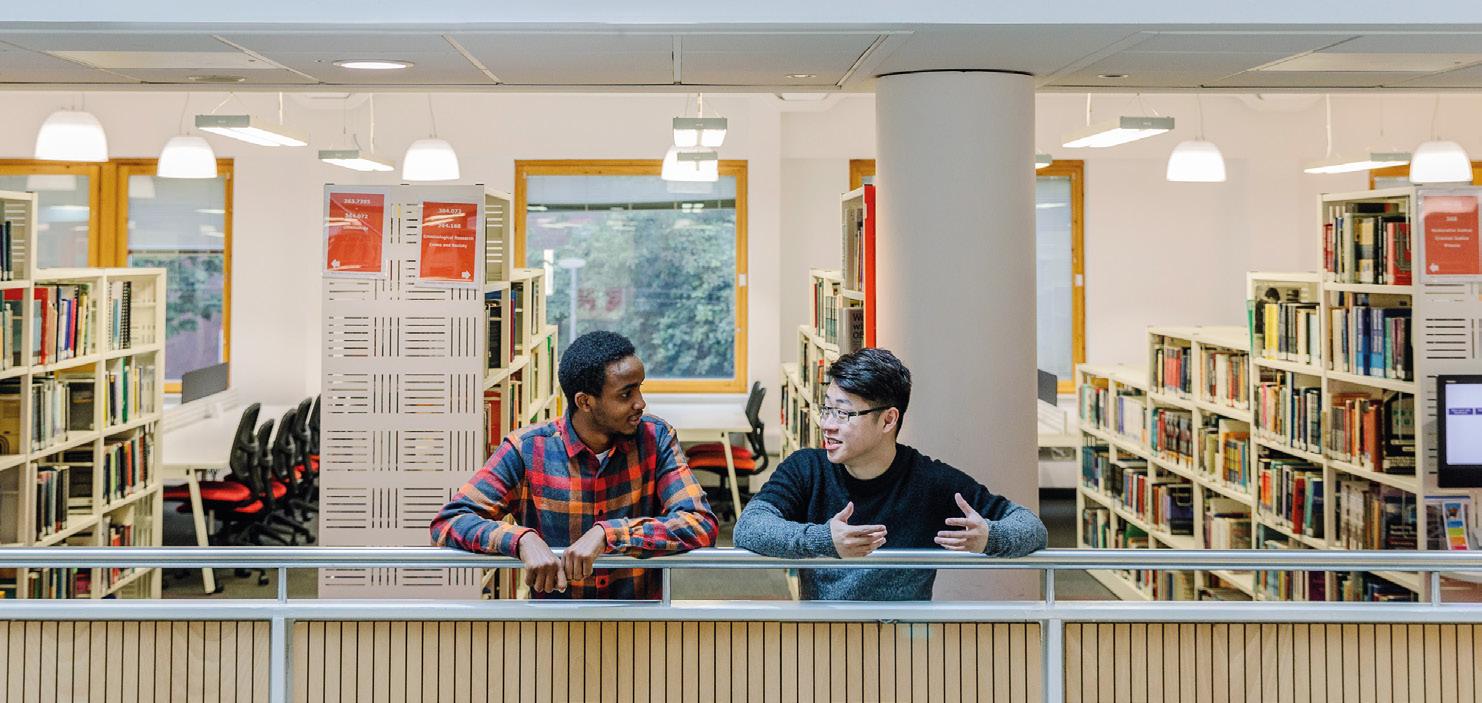
Studying abroad in the UK is an unforgettable adventure. As well as exploring a new and interesting culture, you’ll make friends and memories that last a lifetime — all while earning a prestigious degree that will help you stand out to employers. With a diverse selection of universities to choose from, you can find the perfect study option, and start the exciting next chapter in your life.


If you are a school student and didn’t quite get the grades you wanted in the matriculation exams, don’t worry; you can still study abroad at a great university. A degree preparation course (also known as a pathway course) with Kaplan can help you develop your academic English, study skills and subject knowledge, and meet the entry requirements for a UK degree.
If you are a school student and didn’t quite get the grades you wanted in the matriculation exams, don’t worry; you can still study abroad at a great university. A degree preparation course (also known as a pathway course) with Kaplan can help you develop your academic English, study skills and subject knowledge, and meet the entry requirements for a UK degree.
OUR UK UNIVERSITY PARTNERS
QS World University Rankings 2024
Study at one of the UK’s top universities and live in the largest city in beautiful Scotland.
Study at one of the UK’s top universities and live in the largest city in beautiful Scotland.
Founded in 1451, the University of Glasgow is the fourth-oldest university in the English-speaking world and an established member of the prestigious Russell Group. The University is a leading centre of education and research in Scotland, where you’ll learn from tutors who are experts in their field, giving you the ideal platform for a successful career.
Founded in 1451, the University of Glasgow is the fourth-oldest university in the English-speaking world and an established member of the prestigious Russell Group. The University is a leading centre of education and research in Scotland, where you’ll learn from tutors who are experts in their field, giving you the ideal platform for a successful career.


If you don’t quite meet the entry requirements for a University of Glasgow degree, you can take a degree preparation course at Glasgow International College. At the College, you’ll study on the University’s campus, with tailored academic and wellbeing support from staff who understand the needs of international students. Your course will help you meet the entry requirements for the degree you want to study.
If you don’t quite meet the entry requirements for a University of Glasgow degree, you can take a degree preparation course at Glasgow International College. At the College, you’ll study on the University’s campus, with tailored academic and wellbeing support from staff who understand the needs of international students. Your course will help you meet the entry requirements for the degree you want to study.
You have two options for degree preparation at Glasgow International College, progressing to either a bachelor’s or master’s degree.
You have two options for degree preparation at Glasgow International College, progressing to either a bachelor’s or master’s degree. When you pass your course at the required level, with good attendance, you’re guaranteed a place on your chosen degree.



When you pass your course at the required level, with good attendance, you’re guaranteed a place on your chosen degree.
Foundation Certificate subject options:
Foundation Certificate subject options:
• Arts and Humanities
• Arts and Humanities
Business and Social Sciences
• Business and Social Sciences
• Science and Engineering
• Science and Engineering
Pre-Master’s subject options:
Pre-Master’s subject options:
• Arts and Humanities
• Arts and Humanities
• Business, Economics and Finance
• Business, Economics and Finance
• Law and Social Sciences
• Law and Social Sciences
• Medical, Veterinary and Life Sciences
• Medical, Veterinary and Life Sciences
• Science and Engineering
• Science and Engineering
We can’t wait to welcome you on campus this Autumn. From the moment you arrive, we’ll focus on your safety and wellbeing, so you can focus on your studies - and your future.
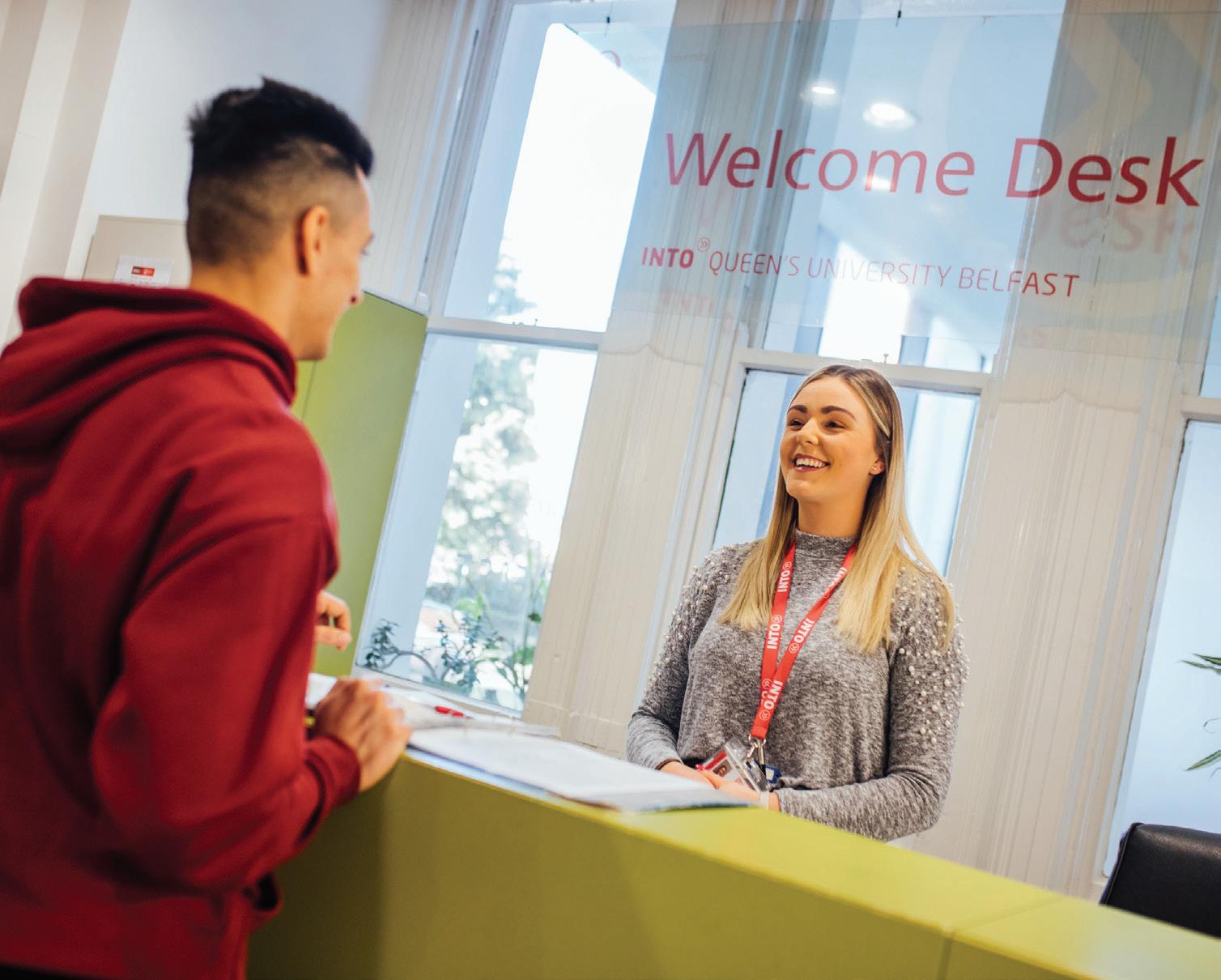
Our Visa Support Services Team are here to answer any queries about Student Route visas and help you submit a successful Student Route visa application. Just send an email to tier4questions@intoglobal.com and we’ll get in touch with you to answer all your queries.

Want to know more about what it’s like to be a student at one of our Centres? Find out more from our current students or staff through our online chat and messaging system.

Chat online at www.intostudy.com/en/campaigns/chat
Please
“I’m so happy that INTO and the University have managed to provide face-to-face classes so we can still experience life on campus. In the accommodation, we are able to have support bubbles, which allowed me to find good friends and experience university life.”
Zhanel, Kazakhstan
What happens if your child’s heart is set on a UK university but doesn’t meet the admission requirements? Is it possible to go to the UK without honours and do a Master’s degree?
Pathway/Foundation/Bridging/International Year 0 – all of these terms are used interchangeably for a “top up” year to qualify for direct entry, not only for kids who don’t make the grade but for students who change their area of interest after matric and need to pick up additional subjects.
For our purposes, let’s stick to “foundation year”. It is normally two or three terms designed to increase academic skills and give a student a broader understanding of the subject that they will be studying.
In the case of a student whose first language isn’t English, this might include an English programme. It is, in most cases, an additional year of university so we might feel it in the bank account, but for children who are not quite ready academically for first year, those who need a bit of extra tuition, study skills, another year of maturity, and a softer landing with smaller classes, it’s the perfect answer.




• The foundation year is linked to the degree you’ll progress onto.
• Not every degree course, and not every university offers a foundation programme.
• There are several private foundation providers (see below).
• Students are introduced to the type of assessments they’ll be taking during their degree, preparing them for what’s to come.
• Foundation year students are students – and in many cases will be on campus and fully immersed in university life.
For many university foundation programmes there is the option to choose to do a foundation year via UCAS or to opt to be directly referred to foundation if you don’t meet the admissions criteria for your chosen degree. Your counsellor should sort through the options with you.
( The Learner’s Journey can help.)
An important aspect of counselling is picking through the list of universities where admission criteria match your results. For instance, if you want to study business, the entry requirements at Exeter are different from the entry requirements at Portsmouth.
If you didn’t meet the Exeter criteria, you will need a foundation programme to get in, but you might be eligible for direct entry at Portsmouth. Does this say something about the quality of the degree? No – quality of the degree is up to the student and who they become in the process. Being in a university programme that is a match for how a student learns best is the key.
There are students who want to be at a particular university for certain reasons –for example, I have had students who want to be at Loughborough for their sport. If they don’t meet the admission criteria, they may opt for a foundation programme to ensure they get in. Other students would rather not do the extra year so they choose to accept direct entry into another university.
When a student hasn’t quite made the grade in one area but is strong in others, they might need what’s called International Year 1 (IY1). Not all foundation providers or universities offer an IY1 and even if they do, it’s not offered for every degree path. IY1 is a full time, first year programme designed specifically for international students who don’t quite meet the university’s academic requirement or English proficiency requirement. IY1 progresses directly into Year 2 of a degree if the student passes the year.
In the Scottish system, where degrees are already four years long, most foundation programmes progress into Year 2, unless there are English Language deficiencies. So they are foundation programmes, but technically IY1. Glasgow International College is the foundation headquarters at Glasgow, and provide this option. At Stirling, there are even foundation options that allow progression into Year 3, an IY2 option.
A foundation programme for postgraduate students is called a pre-master’s. In South Africa, most of our degrees are three-year courses and regular bachelor’s degrees and don’t include an honours. In the UK, most degrees take three years, including honours.
Our students commonly, but not exclusively, cannot gain direct entry into a Master’s degree without an honours year. So what do you do? You do a pre-master’s.

It is basically equivalent to an honours degree. Again, not all universities and all degree paths have a pre-master’s.
It adds an additional year or two terms, with attendant fees, to the length of your Master’s degree. Can this be helpful? Yes it can, because in some cases, as long as you achieve the minimum grades, you are guaranteed acceptance into the Master’s program. You might have an advantage over a student who is competing for a direct application spot on the same programme.
• INTO
• Navitas
• Study Group
• Kaplan
• On Campus
• Oxford International Pathway/foundation providers are independent/private companies that have formed partnerships with universities to support students to progress into the university. It’s a win-win. The universities are getting well-prepared students and providers are assisting students who wouldn’t otherwise qualify for admission.
Note that the foundation providers offer foundations to universities in the UK and other parts of the world. It is important to understand that the services in different countries can vary.
Some universities run private “in-house” foundation programmes like UCL and Coventry

There are also different models for the provision of foundation services. INTO, for instance, has buildings on campus, like at Exeter and Stirling, where they are an integral part of the university, similar to the Kaplan-run Glasgow International College at the University of Glasgow or the Navitas centres at Portsmouth, Plymouth or Hertfordshire.
Kaplan also has the Kaplan International College in London, offering preparation courses at various levels for access to a variety of universities in the UK. Watch this video tour of KIC London.
International Year 1 is not offered everywhere. For further explanation on this topic, watch these videos from Sussex and INTO
Another item to discuss with a counsellor is around progression and visas. Some foundation programmes guarantee progression, meaning you do not have to reapply for university after foundation year; others require a reapplication for the purposes of your visa.
The way that visas are issued for foundation programmes varies. Some programs will issue a visa for one year with a renewal required once you have completed the foundation programme; other foundation providers will have an incorporated visa for foundation and the following degree path.
Locally, Reddam House offers the NCUK International Foundation Year, allowing students to do their foundation year in South Africa and then progress to one of their partner universities in the UK. Partners include many excellent universities but not every UK university partners with NCUK. This is only necessary if you do not meet the direct admission requirements for your university. If a student has ambitions to study in the UK at one of the NCUK universities and is not quite ready to leave home yet, this could be a good alternative.
Dedicated to providing its students with lifelong employability skills, the University of Stirling won’t just help you succeed academically – it will prepare you for your future career.
• With a range of academic and English language programmes leading to a degree at the University of Stirling, INTO University of Stirling provides a supportive environment where you can build your knowledge, skills and confidence to succeed in your studies, life and career.

• Stirling graduates stand out. All degrees are designed to help you build the skills you will need to develop a clear career path and put you on track for future success.
• Alternatively, you can choose to apply to another leading Scottish university after your INTO course, including:
Inverness
Aberdeen
Dundee
Stirling
Glasgow
Edinburgh
Newcastle
Manchester
Birmingham
London
1 hour to London from Edinburgh and Glasgow 30 mins by train from Glasgow, and 45 minutes from Edinburgh
Our combined academic preparation and degree programmes, designed in partnership with the University of Stirling, allow an easy transition between your preparatory studies and degree. Requiring a single CAS for the duration of your studies, you won’t have to worry about applying for multiple study visas!
Undergraduate degree with International Year One
Undergraduate degree with International Year Two
Postgraduate degree with Graduate Diploma
Entry level Completion of 12 years of schooling or equivalent
Completion of A-levels, first year of university or equivalent
Alternatively, you can prepare for a degree programme at a choice of Scottish universities, such as the University of Dundee or the University of Strathclyde, with our tailored academic pathway programmes.
Completion of undergraduate degree, diploma or equivalent Duration
Entry level
Completion of 12 years of schooling or equivalent
Duration 3 or 4 terms
Completion of undergraduate degree, diploma or equivalent
3 terms
Start dates Jun, Oct and Jan Oct, Jan and Mar
IELTS level From IELTS 4.5 From IELTS 5.5
Minimum study length 4 years
Pathways
• Business, Finance, Economics and Marketing
• Media, Humanities and Social Sciences
• Science, Sport, Computing and Engineering
Award and validating body: Certificate of Higher Education (SCQF Level 7) from the University of Stirling.
The University of Stirling’s top-ranked subject areas
2 years
• Business, Finance and Sport
• Media, Humanities and Social Sciences
• Science, Computing and Engineering
Award and validating body: Graduate Diploma of Higher Education (SCQF Level 10) from the University of Stirling.
Please note that course length and start month options may vary depending on the pathway chosen. Please visit www.intostudy.com/stirling/courses for full information.
Top 5 in the UK for Communication and Media Studies†† Scan the QR code to find out more.
Top 10 in the UK for Education††
We have an excellent success rate, giving you a great chance to progress to the next stage of your journey. Our latest results show just how well our students achieve on their INTO programme.
93% 93%
PASSED of which were ELIGIBLE to progress
Top 15 in the UK for Business Studies††
Our Academic English course is designed for students who need to increase their IELTS level to progress to their INTO course or university degree, with progress of up to one IELTS band per term. Find out more online
STEP 1
Read University Speaking - UK
STEP 2
Contact Heidi at The Learner’s Journey and find out when there is a group counselling session happening at or near your child’s school click here. The group session will get them started with creating the criteria for their university search.

STEP 3
Book an appointment with Heidi for an individual counselling session. The individual session will include guided research for university and degree selection.
4
Be on a fact-finding mission. Attend as many university information sessions and expos with your child as possible.
Visit as many universities as you can: campus tours, online open days, virtual campus tours and connect with students who have attended your short list of universities. Ask them about THEIR experience, but remember it’s THEIR experience, not yours.


Finalise the list of university choices by the beginning of Prelim Exams. Be aware that Medicine application deadlines will be earlier – that schedule will be put in place during individual counselling.
Support your child to study hard and get the best results that they can.
Review university choices – and Heidi will direct the application process.
This list should help with some of the unfamiliar terms you’ll come across on your journey.
BMAT (BioMedical Admissions Test): an aptitude test used as part of the admissions process for Medicine, Biomedical Sciences and Dentistry in some universities in the United Kingdom, Singapore, Spain, Malaysia, Thailand, Hungary, Croatia and the Netherlands.
CLEARING (UK): Process allowing applicants with no offers of places on degree programmes to secure places at institutions, which have vacancies, shortly before the start of the academic year. Begins mid-August each year.
COMMON APP: The Common Application is an undergraduate college admission application that applicants may use to apply to around 800 universities within America and abroad.
CONDITIONAL OFFER: This is an offer made by the admissions team which is dependent on students reaching certain grades in their exams (this will often be issued when a matric student applies with their mock exams) or fulfilling other requirements like proof of English proficiency..
DEFERRAL: simply means delaying; a deferred entry means applying for a course and then taking a year out before starting it.
FOUNDATION YEAR: One- or two-year full- or parttime course to prepare a student for entry to a degree programme in a particular subject if the student doesn’t meet the entry requirements or needs to top up in English language.
GMAT (Graduate Management Admission Test): Graduate Management Admission Test. Examination often taken to meet entrance requirements for MBA programmes.
IELTS: The International English Language Testing System is an international standardised test of English language proficiency for non-native English language speakers.
JOINT HONOURS: A joint honours degree is where you study two subjects which are combined together to make one degree.
LNAT (The Law National Aptitude Test): LNAT universities (UK) require their applicants to take the LNAT because it helps the admissions tutors differentiate between applicants who have similar grades. It is also helpful when applicants have different qualifications. (not all universities will require a LNAT)
MAJOR: Your primary area of study.
MCAT (Medical College Admission Test): The Medical College Admission Test is a computer-based standardized examination for prospective medical students in the United States, Australia, Canada, and Caribbean Islands. It is designed to assess problem solving, critical thinking, written analysis and knowledge of scientific concepts and principles.
MINOR: Your secondary area of study, often optional.
PRIVATE UNIVERSITY: A university that is privately funded. Tuition for a private college or university (before scholarships and grants) is the same for all students.
POLYTECHNIC: Former type of degree-awarding higher education institution in the UK. All polytechnics were elevated to university status in 1992.
PUBLIC UNIVERSITY: A university that is funded by the government. In the USA, public colleges and universities are less expensive for residents of the state where they are located.
RESEARCH UNIVERSITIES (NL): Research universities offer more academically rigorous education that focuses on specific subjects.
RUSSELL GROUP (UK):
The Russell Group is a catch-all term for a group of universities with a shared focus on research and a reputation for academic achievement. The group includes the original six red brick universities. There are currently 24 universities within the Russell Group.
SANDWICH COURSE: Course that includes a long period of work experience. Degree sandwich courses usually last four years, with one whole year spent on a work placement.
STEM: STEM stands for science, technology, engineering and mathematics and refers to any subjects that fall under these four disciplines.
TIER 4 visa (UK): a visa that allows students from outside the UK or Ireland to enter the UK as a full time student.
UCAS (UK): The Universities and Colleges Admissions Service. UK national organisation that administers applications for entry onto full-time UK highereducation programmes. This allows you to apply to 5 university courses for around £28.00.
UKVI: UK Visas and Immigration is a division of the Home Office responsible for the UK’s visa system.
UNCONDITIONAL OFFER: This is an offer made by the admissions team which is not dependent on students reaching certain grades in their exams, or where they already have their exam results and satisfy all admission requirements.
USMLE (USA): The United States Medical Licensing Examination® (USMLE®) is a three-step examination for medical licensure. This test is done following medical school before being matched for a residency program.
Facebook group “What I Wish I Knew About University”
Facebook group “The Village”
University Guidance and Advising “The Learner’s Journey”